Cruise Ship Safety Officer Jobs
Back to All Deck Department Jobs
Register for this Job Now!

Safety Officer Job Description and Duties:
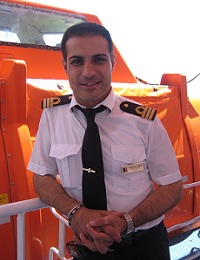
- Depending on the cruise line, the Safety Officer may or may not be required to perform bridge watch keeping duties
- Reprots to the Staff Captain
- Directly responsible for the on board safety and accident prevention program
- Coordinates and organizes all aspects in the management of an emergency situation
- Coordinates all passenger and crew safety drills and along with other appointed deck officers performs safety instructions to crew and staff members from all shipboard departments
- Trains lifeboat, life raft, emergency evacuation and fire-fighting parties and operating crew
- Assist the Staff Captain in the preparation of the lists of in port manning personnel for all departments and hands them to the department heads for internal distribution
- Oversees the maintainance and inspects all supply sources - accumulators, batteries and uninterrupted power supply of all emergency equipment as well as the emergency generator and lights
- Responsible in conjunction with the Staff Chief Engineer for all the fire-fighting and lifesaving equipment aboard the ship - Lifeboats, life rafts and launching devices, life jackets, life rings, fire alarms and detection systems, sprinkler system, fire extinguishers, watertight and fire doors, fire and bilge pumps. Advises the Staff Captain of any defects or malfunctions of safety related equipment
- Makes sure that the public address system is in proper working order and is well heared in all passenger and crew cabins
- Keeps records of safety drill activities and exercises in the deck logbook
- Prepares monthly reports to be handed to the Staff Captain
- Responsible for budget and cost containment through the proper use, handling and maintenance of supplies and equipment
Safety Officer Job Requirements:
Chief or 1st Officer license and all required STCW 95 certificates
Diploma from an accredited maritime training school or facility
Minimum two years experience as a Deck Officer (minimum one year as a 1st or 2nd Officer) aboard a passenger vessel
Very good verbal and written command of the English language
Computer literacy - basic Windows based programs
Decision Making, coaching and team building skills
Safety Officer Salary Range:
$5000 to 8000 U.S. per month depending on the cruise line and time served with the company. Possibilities for promotion to a Staff Captain position.

View Cart Checkout
- No products in the cart.
Subtotal: £ 0.00
Training and certification
- Careers at Sea
Cruise ship industry
Quick links, recruitment process.
CV’s, Letter and Application forms
Interview Guidance
Useful links
Social media
Industry overview
Recruitment
Oil and Gas
Merchant navy, renewable energy, commercial diving, cruise ship training, training and certification required for the cruise ship industry.
Welcome to our section on training and certification required to work onboard cruise ships. Here you’ll find everything you need to know about what is required to work onboard cruise ships.
If you are just starting a career at sea you will need the following mandatory STCW courses:
Elementary First Aid Personal Survival Techniques Personal Safety and Social Responsibilities Fire Prevention and Fire Fighting Proficiency in Security Awareness (as of 1st January 2014)
Although these modules can be done separately it is far more cost effective to be done as a package – the STCW Basic Safety Training package – which will save you over 25%:
STCW-95 Basic Safety Training package
Additional courses to help kick start your career in the cruise industry:
STCW Proficiency in Designated Security Duties
Crowd Management STCW Crisis Management & Human Behaviour
Passenger Safety (get in touch directly for more information)
What else will you need?
ENG1 Medical certificate – Find your nearest approved doctor in the UK (fixed fee of £80)
Seamans Discharge book and card – Click here for more information
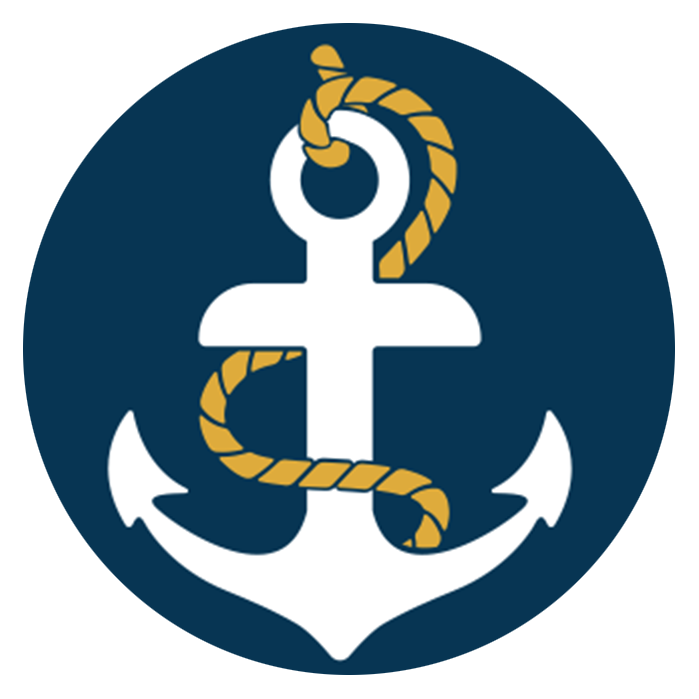
NEED HELP Deciding a course?


What Are The Duties Of Ship Safety Officer (SSO)?
The ISM Code was legislated under SOLAS to mee t the requirements set out in The Merchant Shipping and Fishing Vessels (Health and Safety at Work) Regulations 1997 (SI 1997 No. 2962) (the Regulations) and the Code of Safe Working Practice for Merchant Seafarers (CoSWP).
It has been quoted by several studies done by various authorities that most of the accidents at sea occur due to Human Error.
Accidents at sea can be avoided with a proper training plan in place. All sea-going vessels have a safety management plan with a manager to look after it.
The Ship Safety Officer is appointed to look after the safety of the fellow crew on board and to promote a safety culture and preach safety awareness by means of training and motivation.
If there is no safety culture and supervisor on board ship, it can be a dangerous situation for the ship’s crew and the cargo.
Moreover, in case the ship is involved in an accident, it endangers the marine environment as well, and further increases downtime and financial losses.
Everyone is aware that during port state audits, ship survey etc. the first thing that is checked is how safe the ship is?
Hence the ship’s crew must understand the importance of a safer ship and inculcate a safety awareness culture which can be better done with a qualified safety officer on board ship .
Under the International Safety Management (ISM) code , every ship must appoint a ship safety officer (SSO) who has the knowledge, experience, and skills to look over the important safety issues related to the ship and its crew’s health.
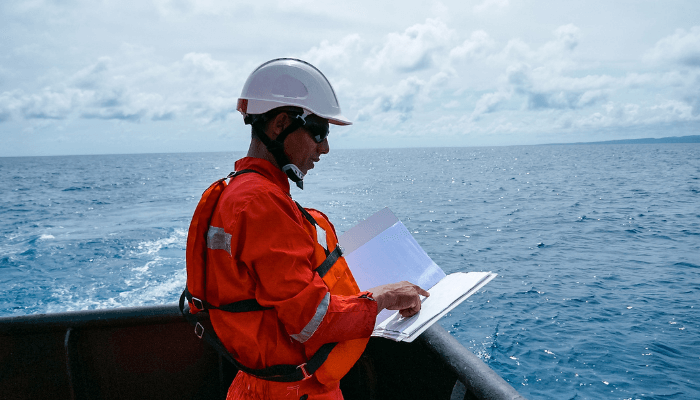
The details of the training guidelines for the Ship Safety Officer is provided in STCW Code 2010 Table A-II/2 & A-III/2 and IMO Model Course 3.11 (Marine Accident & Incident Investigation).
According to the ISM code, a ship safety officer should have a minimum of two years of consecutive sea service. In the case of tanker ships, the safety officer should have six months of experience on tanker ships in addition to two years of consecutive sea service.
The responsibility for the position of the Ship safety officer is usually taken by one of the officers aboard ship. The officer with relevant experience needs to do a Ship Safety Officer Course before joining the ship, which allows him/her to take the responsibility of SSO when onboard.
It is a general practice to not have the Master acting as ship safety officer as the ship captain is already been burdened with several other responsibilities.
Officer of the watch is usually selected as Safety Officer and the responsibility is rotated on a regular basis.
The appointed ship service officer should have the necessary qualities to properly take the responsibilities imposed under the relevant provision of the ISM regulation. He should also help in the proper implementation of the ISM code on the ship.
Duties of Ship Safety Officer
The safety officer of the ship is entitled to look over all the duties related to the safety of the ship. Some of the important duties include:
- To survey the ship for all potential hazards directly affecting the health and safety of the crew
- Supervising and ensuring compliance with the SMS of the ship and its every aspect including the updates and amendments which involve liaising with the Master and the company safety representative
- Coordinating the safety measures to be maintained when cargo work is in progress by liaising with the port representative. Again, compliance with the SMS is important in this regard
- Pointing out deficiencies in any existing security plans/measures and bringing about changes by communicating the same to the Master
- To carry out a safety inspection at regular intervals (at least once in every three months for complete ship)
- Reporting to the Master on non-conformities to the SMS including deficiencies
- Enhancing the awareness with respect to the safety onboard and thereby taking substantial steps for enhancing the safety
- Ensuring the crew always carries their jobs with a safety-conscious attitude and know all the aspects of IMS code and relevant health and safety regulations
- Imparting training to the shipboard personnel if need be so that they may be kept updated with all the latest improvements and at the same time inform them of any deficiencies that might need to be addressed
- To look after and act on the complaints of the crew related to health and safety
- To provide information to ship master regarding the deficiencies and to approach ship Master for removal of any potential hazard from the ship which may lead to an accident
- If there is an accident involved, the SSO will lead the investigation and prepare a report
- To maintain the records all major and minor accidents
- To make sure that all equipment associated with the ISM Code and the SMS are tested, maintained and calibrated accordingly
- To stop the ship operation if it directly affects the safety of the crew or the ship
The ship safety officer is not required to perform any of the above-mentioned duties when an emergency action or response is being taken to safeguard life or safety of a ship. Moreover, he/she is also not in charge of any kind of medical treatment or first aid in case of an emergency.

About Author
Shilavadra Bhattacharjee is a shipbroker with a background in commercial operations after having sailed onboard as a Third Officer. His interests primarily lie in the energy sector, books and travelling.
Read More Articles By This Author >
Disclaimer : The information contained in this website is for general information purposes only. While we endeavour to keep the information up to date and correct, we make no representations or warranties of any kind, express or implied, about the completeness, accuracy, reliability, suitability or availability with respect to the website or the information, products, services, or related graphics contained on the website for any purpose. Any reliance you place on such information is therefore strictly at your own risk.
In no event will we be liable for any loss or damage including without limitation, indirect or consequential loss or damage, or any loss or damage whatsoever arising from loss of data or profits arising out of, or in connection with, the use of this website.
Do you have info to share with us ? Suggest a correction
Related Articles
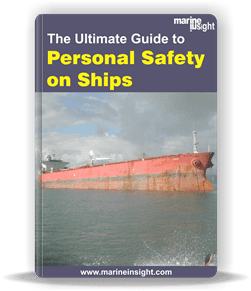
Free eBook – The Ultimate Guide to Personal Safety on Ships
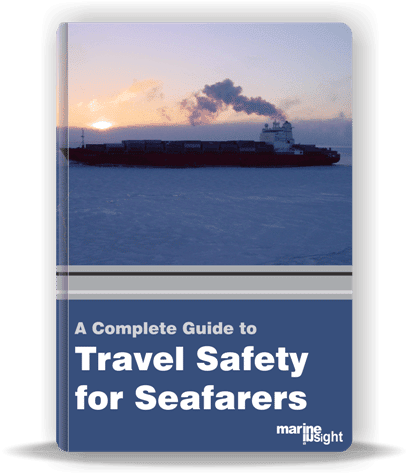
New eBook Launched – A Complete Guide to Travel Safety for Seafarers (With FREE Checklists)
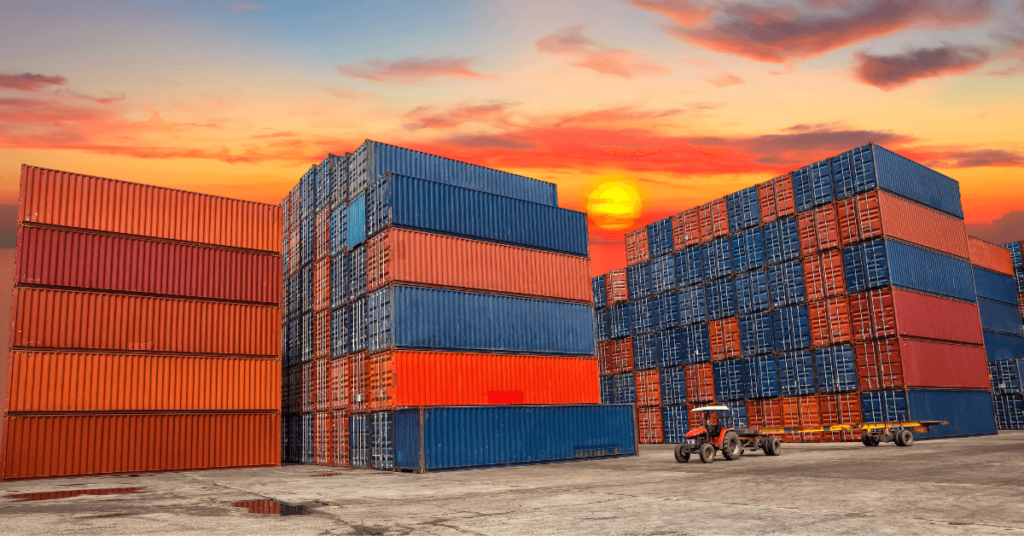
Download LR’s FREE Guide: A Master’s Guide to Container Securing

Daily Maritime News, Straight To Your Inbox
Sign Up To Get Daily Newsletters
Join over 60k+ people who read our daily newsletters
By subscribing, you agree to our Privacy Policy and may receive occasional deal communications; you can unsubscribe anytime.
Related Posts

Dangers Of Malaria And Dengue to Seafarers
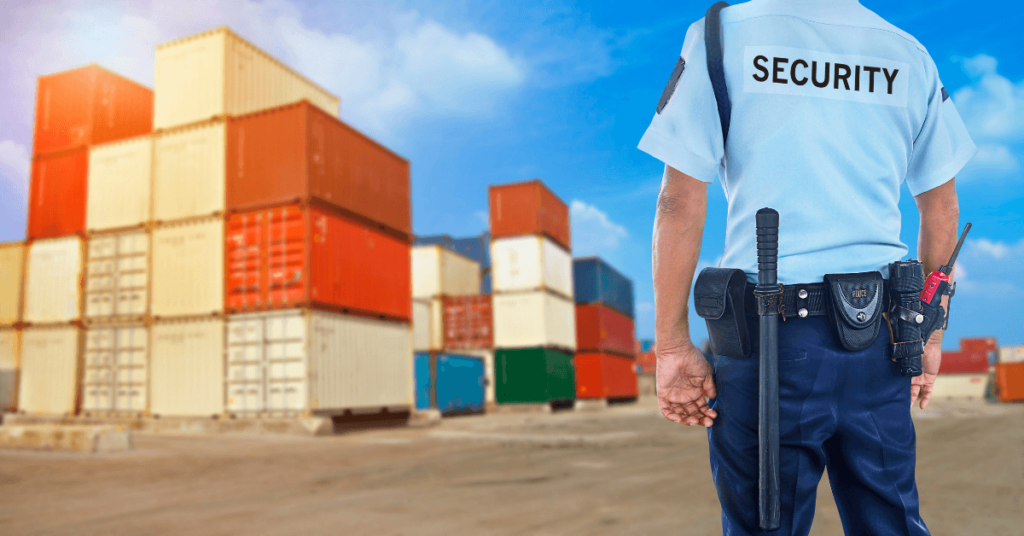
10 Companies Offering Maritime Security Services
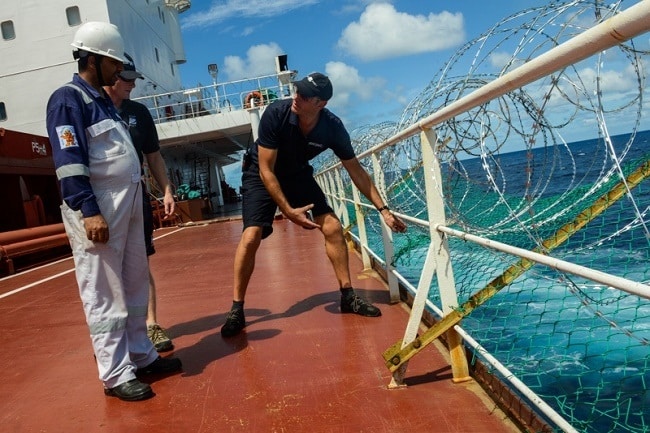
What is Ship Security Assessment (SSA)?
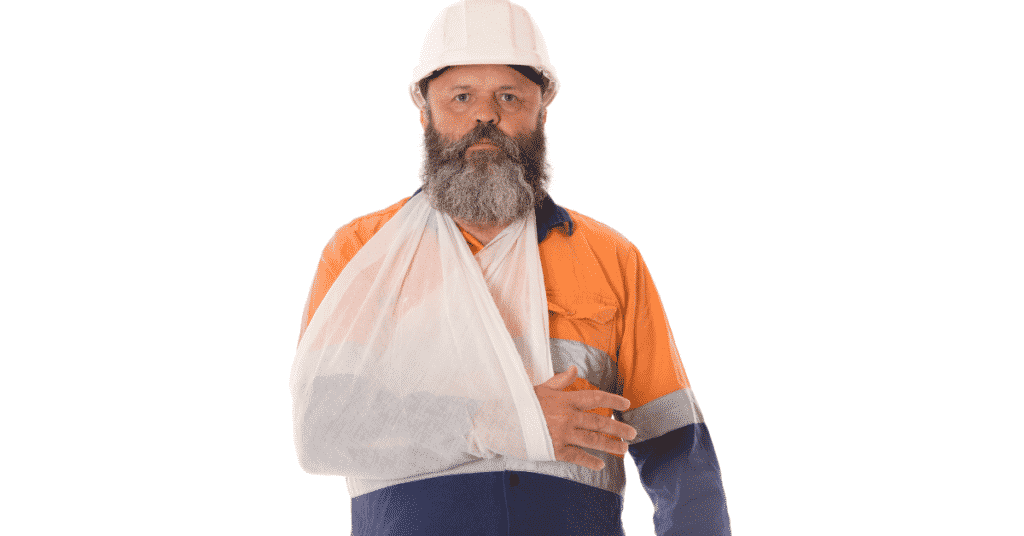
10 Types of Personal Injuries Seafarers Must Be Aware Of
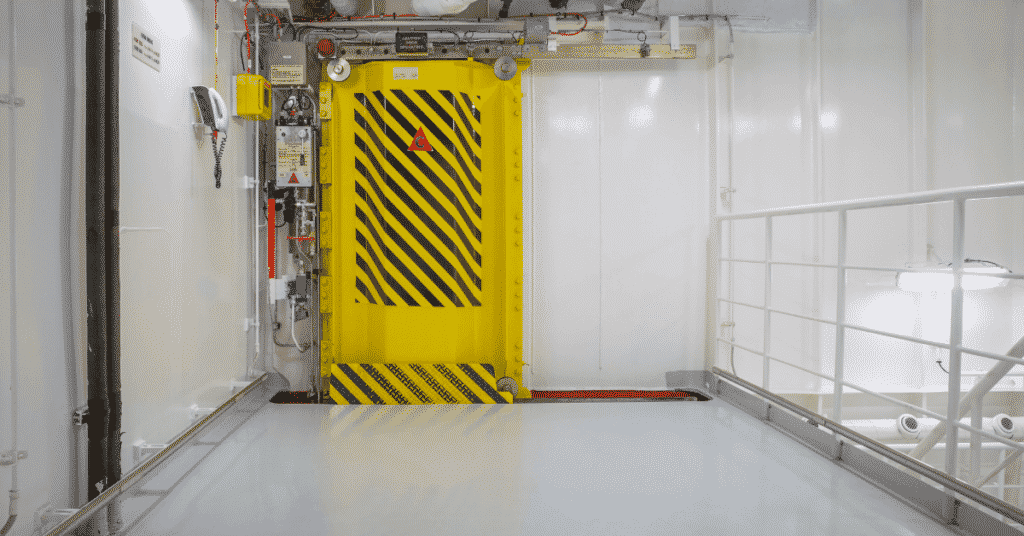
Watertight Doors on Ships: Types, Drills, Maintenance & SOLAS Regulations
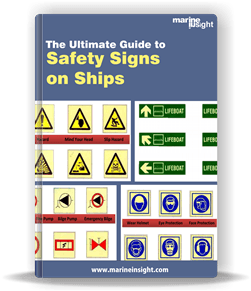
Marine Insight’s New FREE eBook – The Ultimate Guide to Safety Signs on Ships
Be the first to comment, 17 comments.
My name is Sinqobile Gwala I am 25 years .I like to do the safety studies. I live at Empangeni in South Africa.My current job is sales representative
My name is Sunday mavuso at ermelo mpumalanga,,I’m interested in a ship safety officer…
Hi Im abdul shwackydaz, i like to do security ship officer job. My previous experience jobs is Mcdonalds bugger flipper, Shelf item filler stacker man and now working loan man for small family loan business. Want to train security ship course to work with seaman. Always loved seaman!!!! Please advise on best course to be on ship surrounded by seaman?? All my heart wishes and thank you
Please advise what section of the International Safety Management (ISM) code mention’s every ship must appoint a ship safety officer (SSO). Thnx
i am 27 years of age and m looking for a safety officer job i have 1 year experience as safety rep , i did my safety studies at Nosa .I have OHS Act 18001 – Hira -System tools – ashepp – She Rep – Samtrac from Nosa. My numbers are 0749150184.
I currently did my imo saftey courses and i want to be a safety officer onboard ship. What courses should i offer?
Hi i am farhan 25 year old currently working in qatar as a safety officer constriction field i have 2 year exp frm india and 2 year in qatar so i need job on ship as safety officer(0097433251955) my number
Please register your CV here: https://jobs.marineinsight.com/
Hi sir. I am one of the Safety Officer. I have NEBOSH, IOSH, HABC LEVEL 2 FIRE SAFETY. ADOHSM, A.H.A FIRST AID HEART SAVER AMERICAN, H2S AND SO2 AWARENESS, FIRE WARDEN ETC. I HAVE A GOOD EXPERIENCE OF WORKING IN THE GULF AND INDIA. PLEASE PROVIDE ME WITH THE OPPORTUNITY TO WORK WITH YOU AS A SAFETY OFFICER. MY CONTACT NUMBER IS :-+919411703304. . MY EMAIL :[email protected]. Please contact me on the above mentioned and provide me with the opportunity to work with you as a SAFETY OFFICER.
Hi sir. I am one of the Safety Officer. I have NEBOSH, IOSH, HABC LEVEL 2 FIRE SAFETY. ADOHSM, A.H.A FIRST AID HEART SAVER AMERICAN, H2S AND SO2 AWARENESS, FIRE WARDEN ETC. I HAVE A GOOD EXPERIENCE OF WORKING In GULF AND INDIA .PLEASE PROVIDE ME WITH THE OPPORTUNITY TO WORK WITH YOU AS A MARINE SAFETY OFFICER. MY CONTACT NUMBER IS :-+919411703304. MY EMAIL IS :[email protected]. Please contact me on the above mentioned and provide me with the opportunity to work with you as a “MARINE SAFETY OFFICER “.I WILL SURELY PROVIDE YOU WITH BEST AND LOYAL SERVICE .Waiting for your call. MARINE SAFETY OFFICER (RAMESH GIRI)
Please check our job board- https://jobs.marineinsight.com/
Please advise what section of the International Safety Management (ISM) code mention’s every ship must appoint a ship safety officer (SSO). I finish my safety course and i have 4.5 years expereance in construction safety .Thnx
My name is Sohan Tanaji Borge. I have 5 year’s of IT industry experience. I did NEBOSH,IOSH, HUMAN FOCUS courses. I also want to work on a ship as a safety officer.
Please suggest me what should i do??
Thanks & Regards Sohan
Hi, am Edwin Subam and am doing my third year studying Bachelor of Environmental Health and Science. I am really interested to work as a safety marine officer after I graduate from my bachelor degree programme. Should that be possible if I can be advise about the requirement for the marine safety officer?
pls tell me about that safty officer i m intrested in this field im mechanical engi from india
Hi Niket Safety officer is another designation and role played by ships officer
I have completed masters in physiotherapy..have to work in marine sight..as medical officer how to apply
Leave a Reply
Your email address will not be published. Required fields are marked *
Subscribe to Marine Insight Daily Newsletter
" * " indicates required fields
Marine Engineering
Marine Engine Air Compressor Marine Boiler Oily Water Separator Marine Electrical Ship Generator Ship Stabilizer
Nautical Science
Mooring Bridge Watchkeeping Ship Manoeuvring Nautical Charts Anchoring Nautical Equipment Shipboard Guidelines
Explore
Free Maritime eBooks Premium Maritime eBooks Marine Safety Financial Planning Marine Careers Maritime Law Ship Dry Dock
Shipping News Maritime Reports Videos Maritime Piracy Offshore Safety Of Life At Sea (SOLAS) MARPOL
WAIT! Did You Download 13 FREE Maritime eBooks?
Sign-up and download instantly!
We respect your privacy and take protecting it very seriously. No spam!
WAIT! Did You Download 12 FREE Maritime eBooks?
Are cruises safe? Here’s what you need to know about cruise ship security and safety

If you've watched the news at any point over the past several years, it's likely you've seen disturbing stories about cruise ship norovirus or COVID-19 outbreaks and passengers "falling" overboard. Combine that with reports of sexual assault and fistfights, and it's no surprise you might be wondering whether cruise ships are safe.
Here, I'll address some prospective passengers' biggest concerns and offer tips and advice on cruise ship safety so you can maintain peace of mind on your voyage.
For more cruise news, guides and tips, sign up for TPG's cruise newsletter .
Are cruise ships safe?
Let's cut right to the chase: Yes, cruise ships are generally safe as long as you use common sense and remember that vessels are not impervious to accidents, illness or people who just don't know how to behave. As with any place you might live or visit ashore, there are risks, but those risks can be mitigated if you keep a few simple tenets top of mind.
The key thing to recognize is that you should maintain the same level of awareness, self-control and vigilance as you would anywhere else. When you're in your hometown, would you invite a complete stranger into your bedroom, leave your wallet unattended in plain sight or allow your very young child to run around unsupervised? If the answer is no, you shouldn't be doing those things on a cruise ship, either. (And if the answer is yes, I have questions.)
Although you have power over the above, sometimes circumstances are beyond your control. Perhaps the weather is bad, or something mechanical goes wrong with the vessel. Cruise ships are equipped with advanced navigational equipment to avoid storms, and engine room contingencies allow onboard operations to continue, even if the ship's speed or propulsion is affected.
Ships also employ entire onboard teams of engineers and mechanics who are able to fix problems on the spot, as well as crew members trained to fight fires. The bridge — the ship's main control center — is constantly in touch with shoreside teams who provide additional assistance.
With that, here's a bit more advice on how to make your sailing safer, followed by answers to some of your most burning safety-related queries.
Cruise safety tips
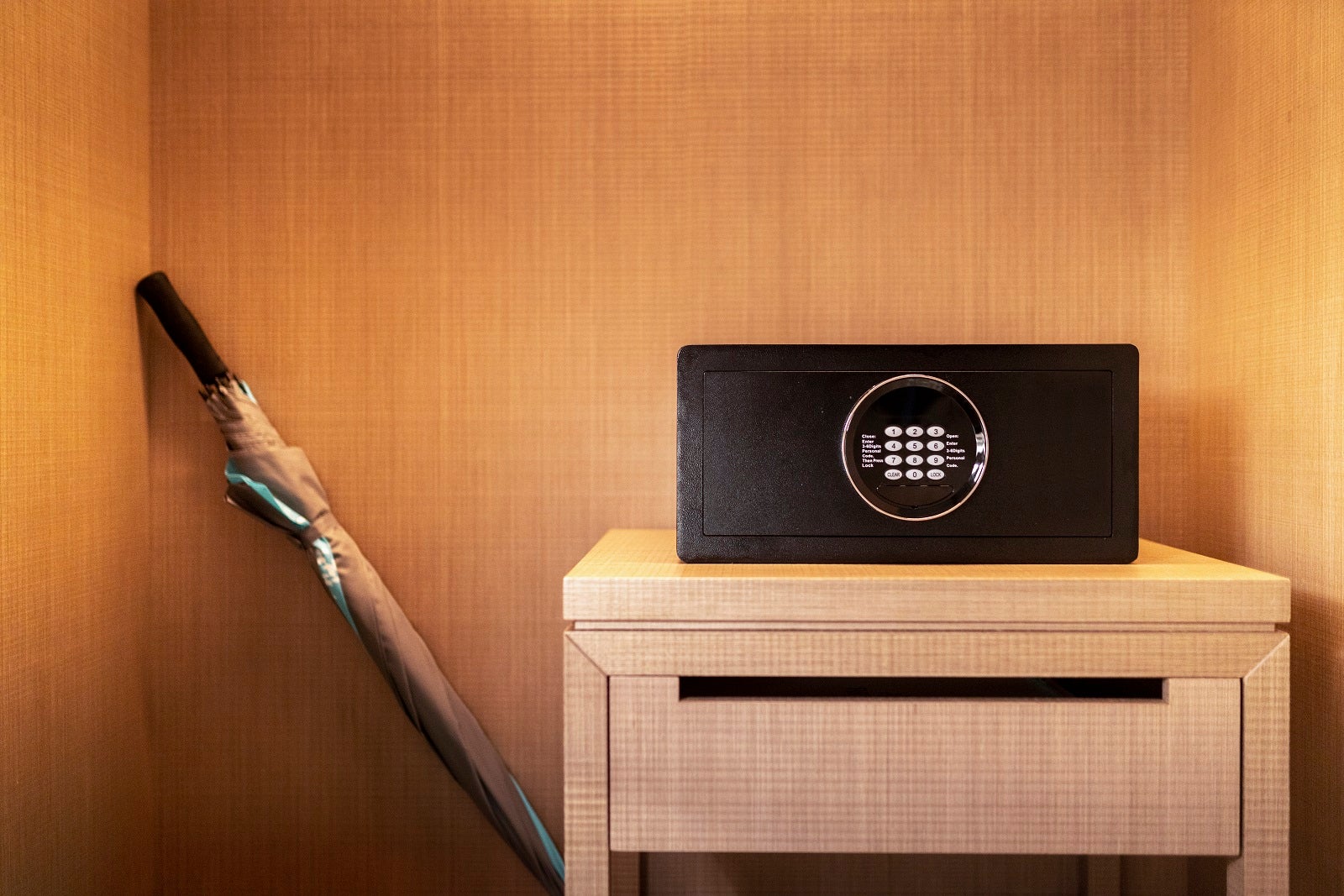
Cruise ship safety measures are in place on every vessel in every major cruise line's fleet. However, there are some extra tips you can follow to stay safe on a cruise.
- Pay attention during the muster drill. Muster drills are a pain, and nobody likes them. However, they tell you what to do in case of an emergency, so it behooves you to pay attention. The information offered during them — including where your muster station is and how to properly don a life jacket — could end up saving your life.
- Keep a close eye on your keycard. Treat it the same as you'd treat a credit card or your keys. It grants access to your cabin and also serves as your onboard charge card for purchases. If you lose it, report it to guest services immediately so they can deactivate the old one and issue you a replacement.
- Lock up your valuables. Keep your jewelry, passports, wallets, electronics and other important items locked in your cabin safe when you aren't using them, and don't leave them lying unattended in public areas.
- Don't invite strangers to your cabin. Don't tell them your cabin number or otherwise divulge sensitive personal information. If you're cruising by yourself, also use caution when telling people you're alone.
- Supervise your children. Allowing young children to roam the ship alone without an adult or member of the youth club staff is not only potentially unsafe but also can be an annoyance to other passengers.
- Avoid drinking so much alcohol that you lose your wits. It could lead to slipping and falling or cause you to engage in unsafe behaviors, such as entering crew areas or climbing on railings. It also could make you more susceptible to theft or assault. Plus, hangovers can really put a damper on the next day's fun.
- Steer clear of crew-only areas, and never stand on furniture or climb anywhere you aren't supposed to be. Restricted areas are restricted for a reason, and entering them can result in injury or death.
- Don't assume everyone on your sailing is trustworthy. Simply being on the same ship doesn't mean your fellow passengers are on the up and up. Most are, but some might not be. Treat strangers with the same level of scrutiny as you would in any other environment.
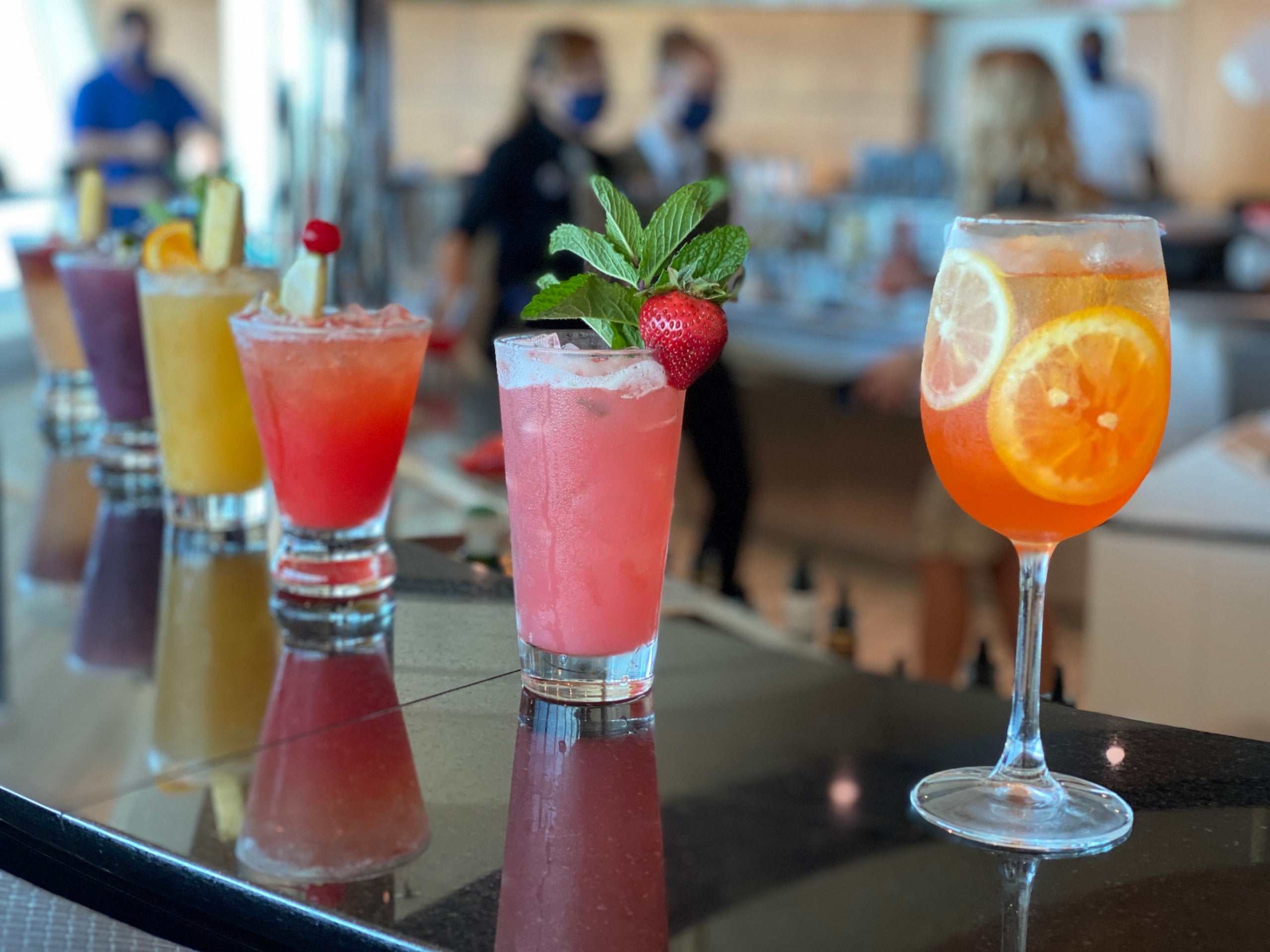
Are there police on cruise ships?
Do cruise ships have police? Is there security on cruise ships? Again, the answer is yes. Cruise ship police officers are more like security guards, many of whom serve as law enforcement officers or members of the military in their countries of residence when they aren't working on board.
Cruise security guards have the authority to break up fights and mitigate passenger hostility, drunkenness and other inappropriate behavior. They also have the authority to place rowdy, violent or otherwise dangerous passengers in the ship's jail, known as a brig .
Serious rule violations could warrant cruisers' removal from the ship at the next port of call and notification of authorities. However, maritime law is dicey and often unclear when it comes to which country has jurisdiction over crimes that happen in international waters.
Will I get sick on a cruise?

Getting sick on a cruise is a possibility, as it is anywhere you go. However, ships are held to high cleanliness standards that are dictated and monitored by the U.S. Centers for Disease Control and Prevention via the Vessel Sanitation Program, which was implemented in the 1970s.
The VSP requires all passenger ships that carry more than 13 people to submit to random, unannounced inspections if they wish to visit ports in the U.S. The requirements are rigorous, and any score lower than 86 out of 100 is considered failing. (Scores and lists of infractions for all ships can be found on the VSP website .)
Prior to the COVID-19 pandemic, the biggest health threat on ships was norovirus , which manifests as a highly contagious gastrointestinal illness that's easily spread through food contamination and surface contact in close quarters.
After the coronavirus shut down the industry, cruise lines further strengthened their protocols to include safeguards against airborne pathogens. They included social distancing and mask-wearing requirements , as well as the enhancement of air filtration systems. Other measures included contact tracing protocols, mandatory vaccination requirements and the expansion of onboard medical facilities and staff.
Many of the COVID-19-related policies — including requirements for mask-wearing and mandatory vaccination — have been relaxed, but the lines are able to reinstate them quickly if needed.
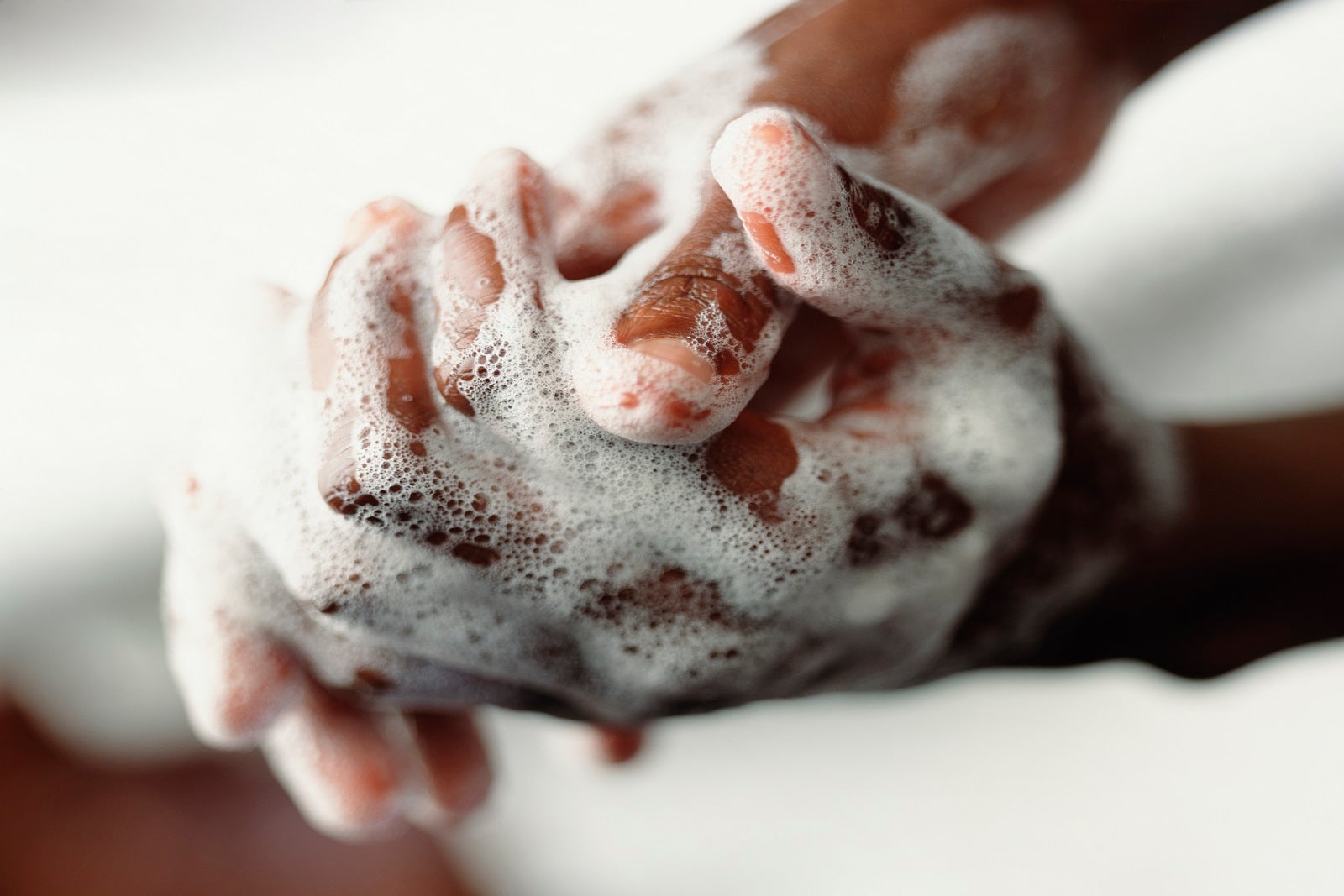
In addition to following cruise ship wellness policies, there are other ways you can minimize your chances of becoming ill when you sail. The best way to avoid both catching and transmitting germs is to wash your hands, particularly before eating and after using the restroom or coming in contact with high-touch surfaces like handrails and elevator buttons.
Hand sanitizer is plentiful on ships, too; while it's great for use between trips to the sink, it shouldn't be a substitute for thorough and frequent hand-washing. Additionally, when you cough or sneeze, do so into your upper arm or the crook of your elbow.
With regard to seasickness , toss a couple of remedies into your bag when you're packing. Tried-and-true options include Dramamine or Bonine pills, acupressure bands, ginger candies and behind-the-ear patches. In a pinch, seek out a green apple or ginger ale from the buffet or room service.
Also make sure you're getting plenty of rest, staying hydrated, wearing sunscreen with an appropriate SPF and knowing your limits when it comes to alcohol.
Above all, if you're feeling ill before embarkation, don't cruise. Take advantage of your travel insurance 's cancel for any reason coverage (if that's included in your particular policy) to get your money back and avoid spreading sickness to others.
Can you fall off a cruise ship?
Yes, it's possible to fall off a cruise ship , but it doesn't happen without effort. To help ensure passenger safety, cruise vessels' cabin balconies and outdoor decks have railings that are roughly chest height on an average-size person. Thick metal or Plexiglas panels or metal bars are positioned under the railings to prevent people from slipping through. Even so, it's important to keep a close watch on young children at all times.
Most people who go overboard fall because they were inebriated, entered a restricted area or engaged in behavior they shouldn't have — such as standing on railings or furniture or climbing between balconies — or a combination thereof.
It's not possible for someone to slip on a wet deck or trip over a door frame and simply fall off a cruise ship.
Do cruise ships have enough lifeboats?
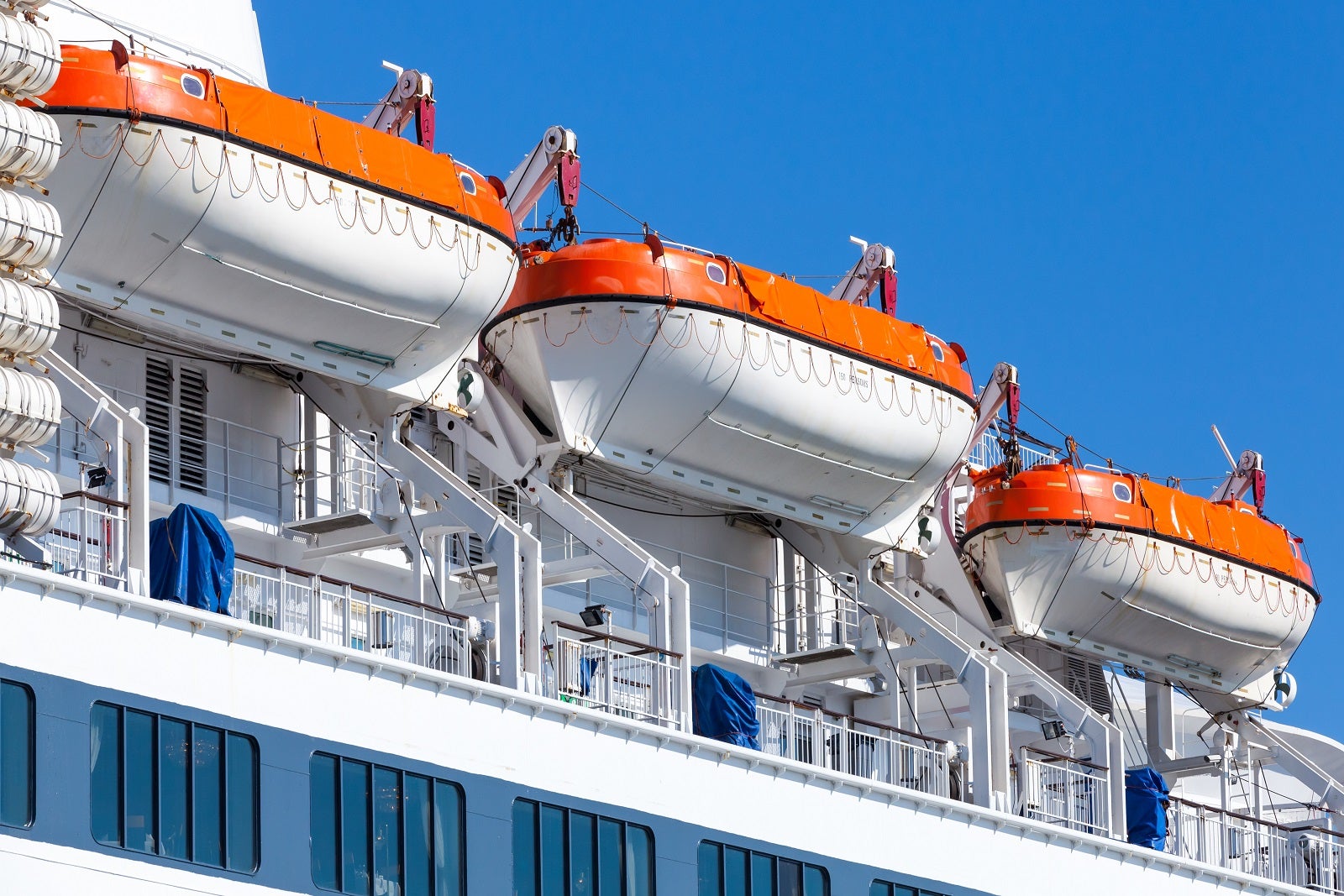
Yes, they do. Following the sinking of the Titanic, which didn't have enough lifeboats for everyone, the international maritime community developed Safety of Life at Sea standards. Under SOLAS, passenger ships are now required to carry enough lifeboats for all passengers. They are outfitted with navigation and communications equipment and basic necessities required for survival until help arrives.
Additionally, ships are required to hold muster drills for all cruisers prior to the start of each voyage, even for passengers who have cruised before. During the drills, guests learn what to do and where to report in the event of an emergency. They also learn what the emergency signal sounds like and how to put on a life jacket. (Ships must also carry enough life jackets for everyone, including specially designed ones for children and pets.)
Do cruise ships have doctors?
Yes, all big mainstream oceangoing cruise ships have trained medical staff on board, usually a combination of doctors and nurses. Many cruise lines increased the number of medical professionals on their ships following the onset of COVID-19.
Cruise ship medical centers are equipped to perform basic stabilization in the event of accidents, illness and other emergencies. They are not full hospitals, though, which means beds are limited, and they lack more complex treatment capabilities. They are designed to keep passengers stabilized and comfortable until they can be sent to a nearby land-based hospital.
They can, however, treat things like seasickness, cuts and bruises and other minor ailments without the need to offload passengers. They are also now equipped to conduct COVID-19 testing and isolation, and ventilators are on hand in the event that any serious cases arise.
Note that because they are never far from land-based medical care, most river cruise vessels do not have onboard medical staff. Additionally, medical care can be expensive on cruise ships that do offer it. It's generally not covered by regular health insurance, so always purchase a travel insurance policy.
Bottom line
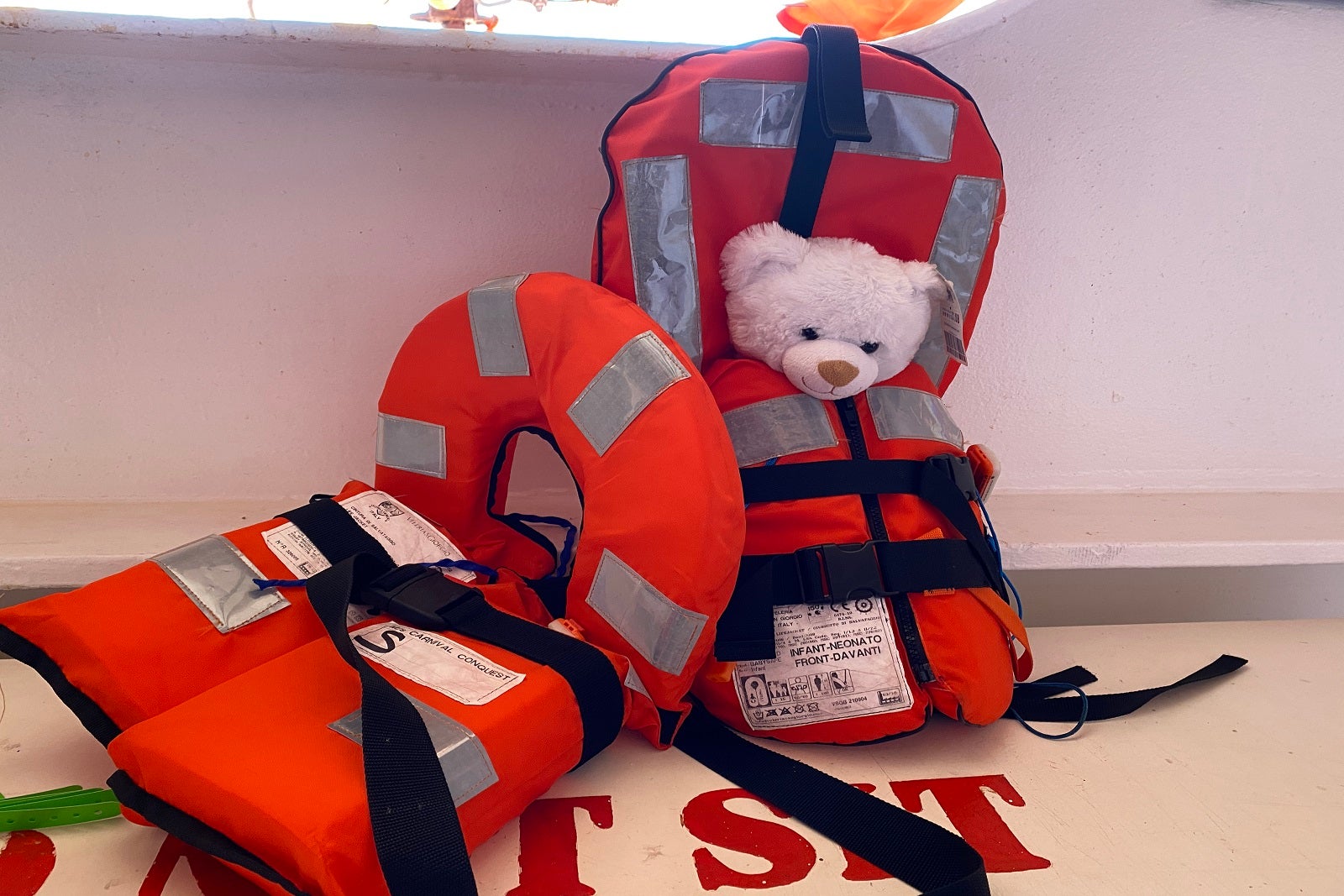
So, are cruises dangerous? The answer is, generally, no. They're safe if you follow the same common-sense practices you'd use anywhere else. It's easy to let your guard down when you're having a great time on vacation, but remember: Cruise ships are like floating cities, which means they aren't immune to potential dangers.
Cruise ship safety is the responsibility of both the cruise line and individual passengers. Make sure to exercise an appropriate level of vigilance by protecting your valuables, refraining from inviting strangers to your cabin or giving out too much personal information, paying attention to muster drills, frequently washing your hands, keeping an eye on your children, staying out of restricted areas and knowing your limits when it comes to alcohol consumption.
Have more cruise questions? TPG has answers:
- Packing for a cruise? These items aren't allowed on board
- Man overboard: Cruise ship overboards and how they happen
- What is baked Alaska, and why is it paraded around cruise ships?
- What are the largest cruise ships in the world?
- Gentlemen hosts: These men cruise to make sure single ladies have a great time
- What is the Jones Act and how does it impact cruise ships?
- What is a lido deck on a cruise ship?
- What's a cruise cabin guarantee and will it save you money?
- What's the difference between a cruise ship concierge and a butler?
How To Become a Cruise Ship Security Officer
- strongtowersecurity
- January 5, 2024
- No Comments
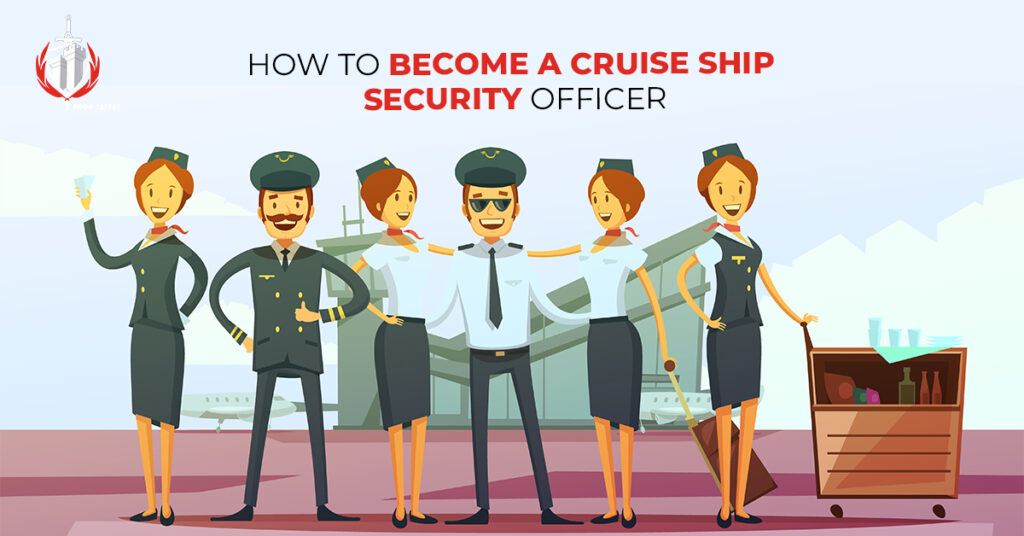
Introduction
Starting a journey into cruise ship security opens doors to a super important job. Cruise ship security officers are like protectors on floating cities in the sea. They ensure everyone on the ship stays safe and happy, watching out for all the travelers.
Becoming a cruise ship security officer is not just a job; it’s a meaningful adventure where you help keep sea trips safe and enjoyable. In sunny California, where the waves meet the sun, skilled security guards on cruise ships are really needed. You’ll need some certificates, stay fit, and learn about securing things to get there. Cruise ship security is a mission to keep sea adventures safe and fun, giving you a chance to grow and have exciting responsibilities.
So, if you want to begin your career as a cruise ship officer , this is your guide to kick-start your journey. Cruise into cruise ship security and let the sea of possibilities guide you to a cool and important job. So, let’s begin to explore your career possibilities in cruise ship security.
Role of a Cruise Ship Security Officer
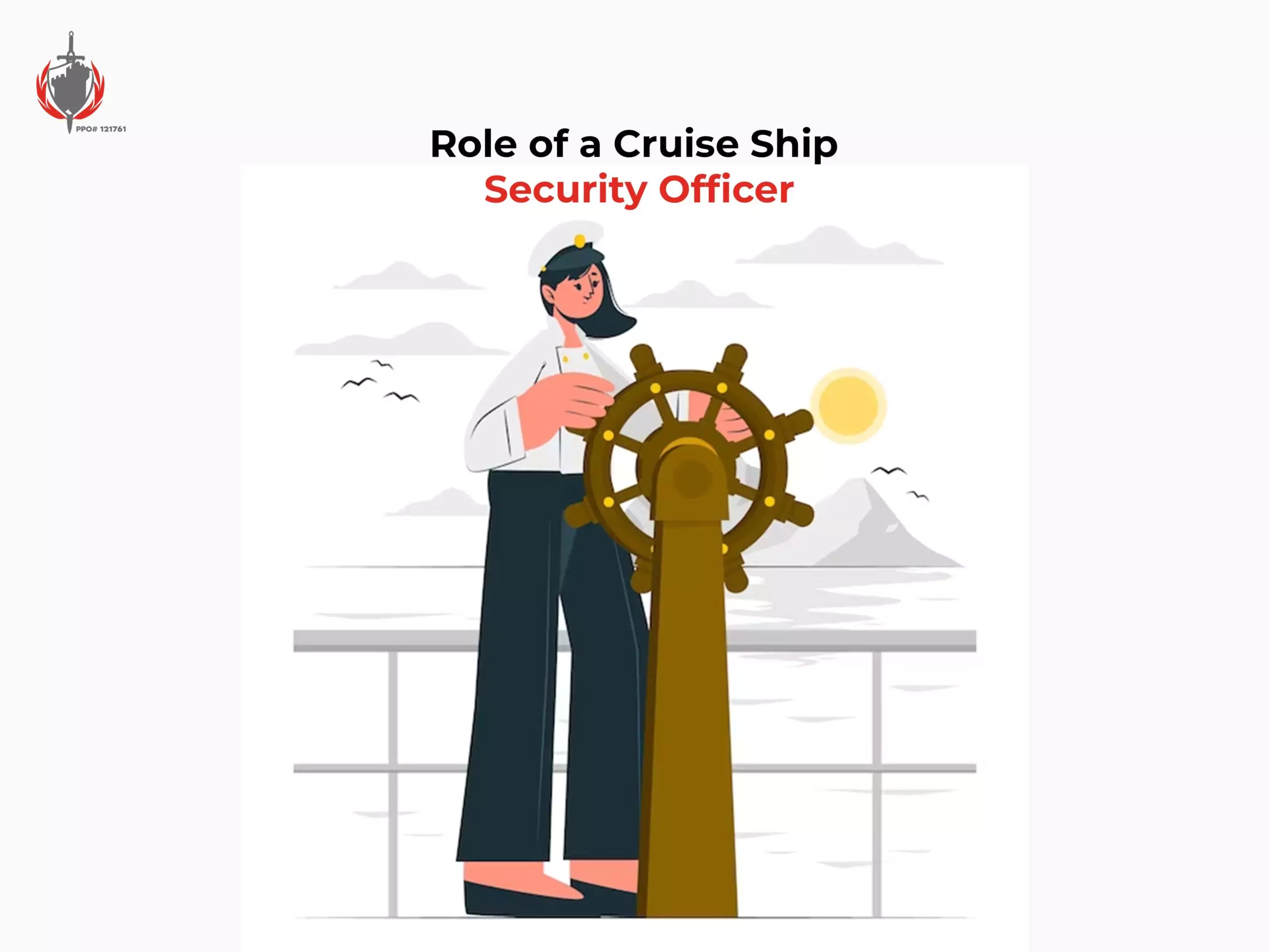
Have you ever wondered who makes sure your cruise is safe and fun? That’s the Cruise Ship Security Officer! Their excellent job goes beyond checking tickets – they watch over everything to ensure you’re safe. From using fancy cameras to checking every corner, they stop problems before they happen. Imagine handling big crowds and different people every day – that’s their daily adventure. The most important part? Making sure you and everyone on the ship have a great time, no worries. So, these security heroes quietly work to make your journey awesome and safe when cruising the sea. Smooth sailing, thanks to the Cruise Ship Security Officers!
Qualifications and Requirements
You’ll need some things to become a Cruise Ship Security Officer and keep everyone safe on sea journeys. First, finish high school or something like that. Get certificates for security and first aid – they’re like superhero tools. Then, you’ll undergo special training to learn how to handle problems and keep things safe on the ship. But it’s not just about papers and courses – you need extraordinary skills, like talking nicely to people, being ready for anything, and staying calm if things get tricky. So, if you’re considering this adventure, ensure you’ve got these things – it’s your ticket to a fun and essential job at sea!
Cruise Ship Security Protocols
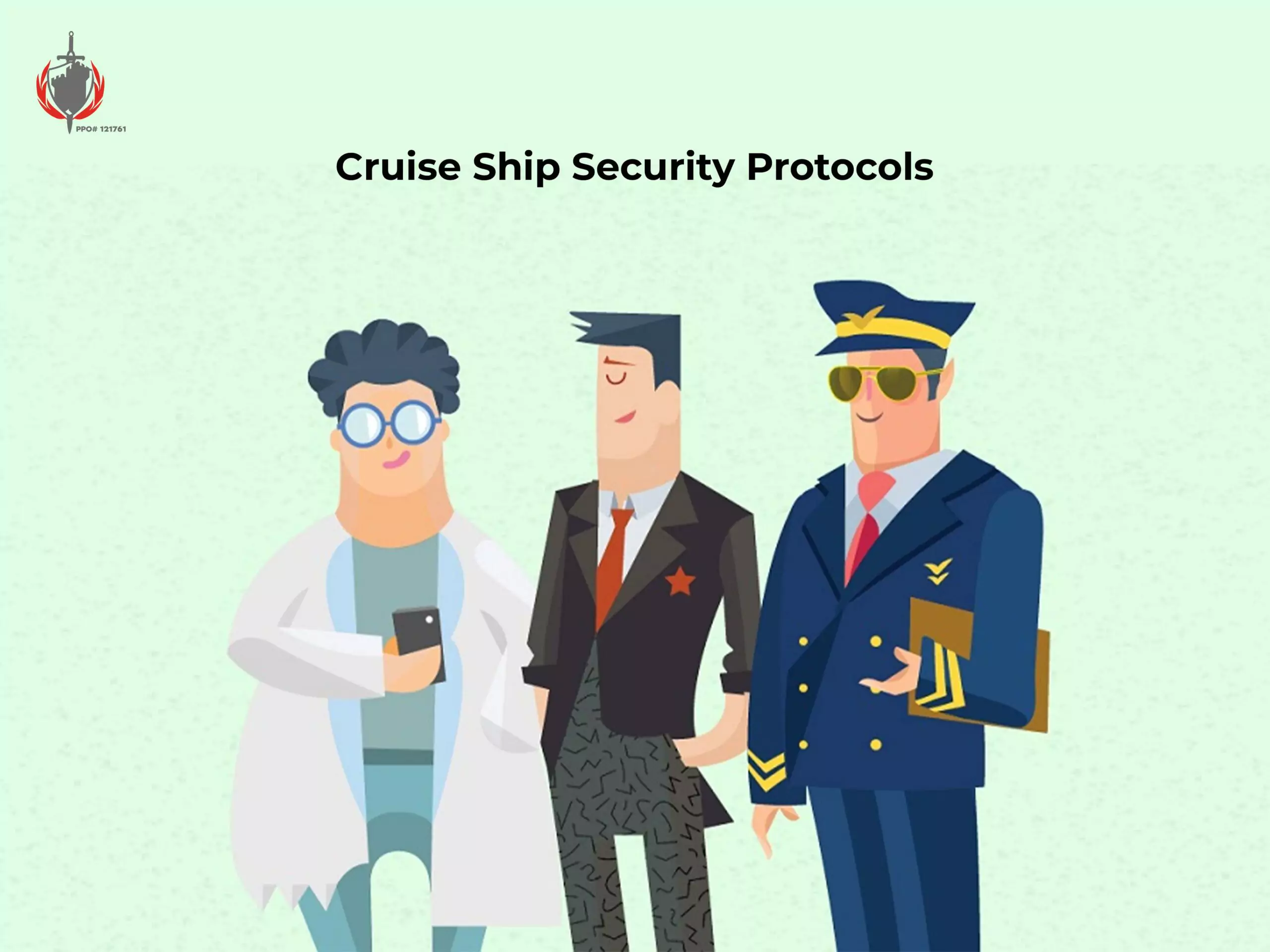
Keeping everyone safe on a cruise involves having special rules, like a plan. These rules, called security protocols, cover everything from watching over the ship to dealing with problems quickly. To do this, Cruise Ship Security Officers learn what to do in emergencies and how to work together with other ship staff to keep everything secure. It’s like a significant team effort, making sure everyone on the ship has a safe and happy journey. So, when you’re on a cruise, know these simple yet important rules are in place to make your adventure smooth and worry-free!
Career Path and Advancement Opportunities
When it comes to a career in cruise ship security, starting small can lead to big adventures. Begin with entry-level positions to gain valuable experience, whether checking passes or keeping an eye on things. As you learn the ropes, there’s a chance for real growth within the cruise ship security world. You could climb up the ladder, taking on more responsibilities and becoming a leader in security. What are the perks of this career journey? Besides the satisfaction of keeping the seas safe, there’s the chance to explore different roles and places. Choosing a career in cruise ship security means more than just a job – it’s a ticket to a journey full of opportunities and personal growth. So, if you’re looking for a career with a view, cruise ship security might be your ideal destination.
Cruise Ship Security in California
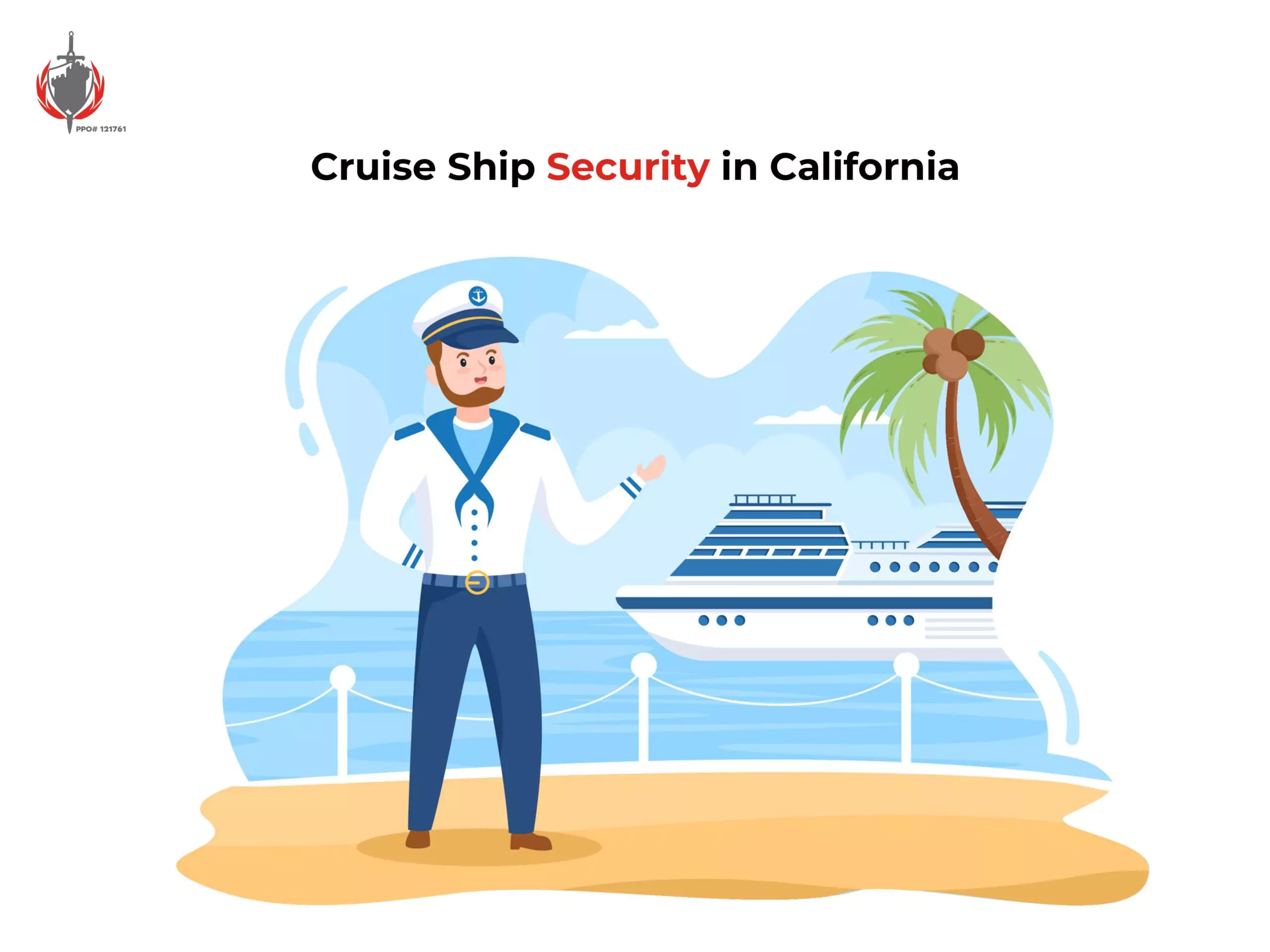
Now, let’s talk about cruise ship security in California – it’s a bit special! The sunny shores bring some unique things to consider when keeping everyone safe on the cruise. The Cruise Ship Security Guards are heroes, ensuring people feel protected while cruising along California’s beaches. And guess what? There are some big companies doing this important job in California. So, if you’re considering cruises and security, know that these guards and companies are working hard to ensure smooth sailing along California’s beautiful coasts.
You might also like 14 Different Types of Security Guards and What They Do
Training and Preparation
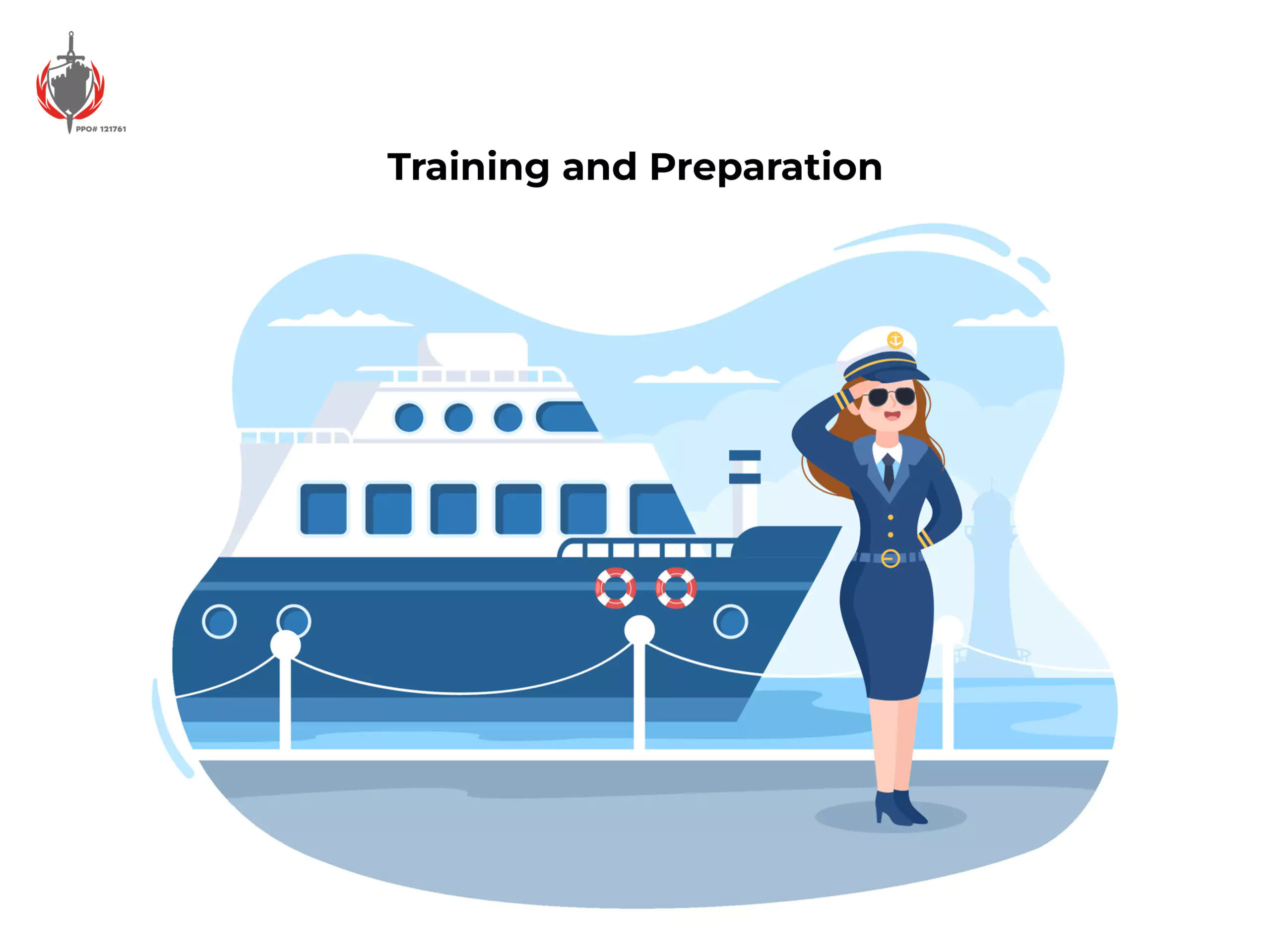
If you’re considering a cruise ship security officer job, here’s your guide to getting ready. Start by figuring out what you need to know and do to be all set for this excellent job. Take some courses and get certifications – they’re like your special tools for the job. And don’t forget to listen to the experienced folks who have been there before. Their advice is like a map, helping you navigate the training journey. So, gear up, get ready, and set sail into California’s world of cruise ship security . You’ve got this!
Application Process
If you are thinking of getting a cruise ship security job, Easy-peasy! First, figure out the steps to apply – it’s like making a plan. Then, know what they usually want during the hiring process, maybe some forms and talking about yourself. And here’s an excellent tip: learn to shine and stand out. It’s your time to show them why you’re the best for the team. So, get ready, set sail, and smoothly go through the application process. Your dream job on the big seas might be a few steps away!
As we wrap up our journey into cruise ship security, remember, this job is like a giant sea adventure! Cruise Ship Security Officers are the heroes, ensuring everyone stays safe and happy on the ship. From California’s sunny coasts to the vast oceans, they work hard to keep your sea trips smooth and worry-free.To start your adventure in cruise ship security , we talked about what you need – certificates and excellent skills. However, applying for the job might seem tricky, but with our guide, you’re ready to go. Just like sailing, this job is not just about following rules. It’s about being part of a team, ready for anything to keep everyone safe. And guess what? You can grow in this job, starting from the basics to becoming a leader.
So, whether you’re dreaming of guarding California’s beaches or sailing the open sea, cruise ship security is full of possibilities. As you set sail on this incredible career, may your journey be as smooth as the sea, filled with exciting moments and the joy of making sea adventures safe for everyone. Good luck with your future adventure in cruise
Leave a Comment Cancel Reply
Your email address will not be published. Required fields are marked *
Save my name, email, and website in this browser for the next time I comment.

Get Protected And Stay Protected
Call Strong Tower Security Corp Today At: 844-787-1810
- Privacy Policy
Social Links
Contact info.

Cruise Ship Safety
Cruise ship safety is regulated by international maritime laws. Those laws govern everything about safety equipment on cruise ships as well as the training and certification of its crewmembers. Here’s what you need to know.

International Regulations on Cruise Ship Safety
International Maritime Organization (IMO) is a United Nations organization responsible for improving safety onboard all vessels, including cruise ships. This governing body has developed rules and regulations for all officers and crews to adhere to such as Safety of Life at Sea (SOLAS) and Standards of Training, Certification and Watchkeeping (STCW). The main objective is to specify the minimum standards of safety for a ship.
The STCW was first implemented in 1978 (STCW78), amended in 1995 (STCW95) and amended again in 2010 STCW2010 [ PDF ] The focus is on ensuring that all ships have officers and crewmembers with the necessary licences, certification and training. The latest STCW amendments have started being implemented on cruise ships since January 2012. This additional set of regulations has made changes to such issues as rest hours for seafarers, professional training and certification, medical fitness standards and alcohol abuse.
Port State Control and Flag State Control make sure that the vessels are complying with all of the rules and regulations. Port authorities such the United States Coast Guard (USCG), Canadian Coast Guard (CCG), or Maritime and Coast Agency in the UK (MCA) make sure that ships are compliant in their respective waters. Additionally, depending on the flag that the ship flies determines the country that ensures their own compliance through inspections, too.
Safety Equipment on Cruise Ships
A cruise ship is not a land-based resort where you can just call the fire department and evacuate the hotel. An emergency at sea is an extraordinary circumstance that requires additional safety equipment to be available onboard. According to SOLAS, cruise ships must meet the minimum requirements of safety when it comes to navigation, communication, lifeboats, fire detection devices, and fire extinguishing apparatus.
According to Cruise Lines International Association ( CLIA ), on an average cruise ship there are approximately, five fire-fighting teams with advanced fire-fighting training, 4,000 smoke detectors, 500 fire extinguishers, 16 miles of sprinkler piping, 5,000 sprinkler heads and 6 miles of fire hose.
Fire zones separated by fire screen doors prevent fire and smoke from penetrating between each zone and cruise ships are outfitted with high fog controls to suppress and extinguish fires. In the case of an abandon ship, there are more than enough lifeboats, liferafts and lifejackets on a cruise ship to accommodate all the passengers and crew.
Safety Training for Cruise Ship Crew
All crew members on cruise ships attend safety training every time they join a ship. This refresher training includes what to do in case you see a fire, how to use a fire extinguisher, how to put on your lifejacket, where the muster stations are, dangers of watertight doors, and lifeboat/liferaft familiarization. Crew members are also instructed on emergency signals as follows:
Each crew member will have an assigned emergency duty. The head of each department is typically responsible for educating their own crew members on what they are supposed to do during an emergency.
Select crew members, typically officers of different departments, have emergency duties that require additional training. For example, the Certificate of Proficiency in Survival Craft (CPSC) is a course that teaches crew members how to be the first or second in charge of a lifeboat. This person learns how to lower and operate a lifeboat in case of an emergency.
Fire teams onboard are typically made up of officers and petty officers that have had advanced fire fighting training. The on-scene commander in charge of the fire is usually the Safety Officer. Although, if the fire is in an Engine Room space then the on-scene commander is typically the Staff Engineer.
Simulated emergencies such as a fire onboard are practiced on a regular basis to exercise the officers and crew in their emergency duties. In addition, there are in-port manning drills that exercise those that may be covering alternate emergency duties. Additional training with lifeboat and liferaft parties is conducted regularly as well.
Cruise Vessel Security and Safety Act 2010
The Cruise Vessel Security and Safety Act is legislation to establish requirements to ensure the security and safety of passengers and crew on cruise vessels. Although much of the cruise industry already followed strict regulations, policies and procedures when it came to safety and security, the United States passed a law that would codify the regulations.
In fact, the USCG testified before Congress in 2007 that it doesn’t believe that Americans are at any significant crime risk while onboard cruise ships. Cruise ship design is already internationally mandated by SOLAS to maximize cruise ship safety, plus port state and flag state inspections are done to verify compliance in safety equipment and training. In addition, all crew undergo rigid pre-employment screening.
Staying Safe on a Cruise Ship
Although there are websites and naysayers that love to shine a negative spotlight on the cruise industry, a cruise ship is an extremely safe environment. Of course, wherever and however you travel in the world, you must always exercise caution. One way is to always follow the policies and procedures of the ship you work on.
On a cruise ship you must also be prepared in the event of an emergency. ( Related Article: Crew Role in Cruise Ship Emergency ) At the very least, crewmembers must understand how to put on their lifejacket, the sound of emergency signals, their emergency duty, and where to muster. Learning everything you can about cruise ship safety and security will help you stay safe while you work and live on board a cruise ship.
Cruise Ship Safety Resources
We use cookies to ensure that we give you the best experience on our website.

- Member Login
- Connect with Us
- Like us on Facebook
- Follow us on Twitter
- Sign Up For Our Jobs Newsletter
May also be called: Deputy Security Officer
Keeping problems to a minimum, and even eliminating them before they start is the job of the Security Officer. They provide security for the ship, crew, and passengers, as well as for the property on board.
The Security Officer is given a Security Plan and is responsible to ensure that all aspects of it are strictly followed. In carrying it out, they will:
- Investigate incidents or accidents and create detailed reports of the results.
- Be thoroughly informed of the safety systems and role during emergencies.
- Create list of all crew members authorized to use the gangplank while in port – with Customs & Immigration information.
- Make regular security inspections around the ship, ensuring security of ship’s stores and cargo.
- Train new deputies of their responsibilities.
A candidate for this position needs to have a minimum of four years in police or military training. They must also have a certificate in Safety and other ones as required, and firearms training. Training in screening technology is also necessary, along with training to detect IED threat.
To view the rest of this page, you will need to be a Premium Member.You are visiting the Members Section as a Free BASIC Member . You will only have access to a limited amount of Job Hunting Tools and Content. For full access you will need to upgrade to a PREMIUM MEMBERSHIP. Upgrade Today
Quartermaster Jobs
You are visiting the Members Section as a Free BASIC Member . You will only have access to a limited amount of Job Hunting Tools and Content. For full access you will need to upgrade to a PREMIUM MEMBERSHIP.
I'm a cruise ship officer. I love my job, but it's not the constant vacation that people assume.
- Cruise officers are in charge of the safety and navigation of massive ships carrying thousands of passengers.
- Third Officer Natalie Grillo said the position is extremely rewarding and requires a strong work ethic.
- The most challenging aspects are the erratic sleep schedule and work-life balance, she told Insider.

This as-told-to essay is based on conversations with Natalie Grillo, a 25-year-old third officer at a major US cruise line. She has chosen to exclude her employer's name due to the company's media policy, but her employment has been verified by Insider. Her words have been edited for length and clarity.
I think a lot of people have this misconception that it's easy to work on a cruise ship because they think we're vacationing and not actually working. They don't realize the amount of work that goes into making those vacations for other people.
Whether you're a dishwasher, housekeeper, or an officer like me, you're doing hours and hours of labor, all for the benefit of the guests, with rarely any days off. I've worked in the oil field, on research vessels, and on small boats, but working on a cruise ship is the most difficult job I've ever had.
As a Third Officer, my job is half safety and half navigation. I'm living and working onboard cruise ships anywhere from six to nine months of the year. My typical contract is two to three months with two months of vacation in between.
My favorite part of the job is how challenging it is. You're constantly working your way up to becoming the captain. Every day there's something new to learn and that's really important for me. As you learn more, you get a fuller understanding of everything that's happening on the vessel.
Working on a cruise ship has also allowed me to meet people that I would have never met otherwise. I've never been to South America or Indonesia, but I've met so many people from those locations and have gained a better understanding of what their lives and culture are like. It really gives you a better worldview.
I often have to choose between sleep and social life
My least favorite part of the job is the sleep schedule. I wouldn't give up my job for the world but I do wish that there were more hours in the day because the job legitimately never stops. You work seven days a week and there are no days off until your contract is over.
Cruise ship officers are divided into three different "watch groups" that are assigned two shifts that are four hours long. You either work from midnight to 4 a.m. and then noon to 4 p.m., 4 a.m. to 8 a.m. and then 4 p.m. to 8 p.m., or 8 a.m. to noon and then 8 p.m. to midnight.
Getting enough rest is all a juggling act — do I want to sleep or do I want to go out? Do I want to go to the show or do I want to watch a movie? But you make those deals with yourself of how much am I willing to give to get.
I see my friends when I can but oftentimes my shift schedule is a lot different from theirs because most crew work during the day. Social life onboard really just depends on the job or the shifts that you have.
The crew bar opens at 10 p.m. and stays open until about two in the morning. If you want, you can have your friends over in your cabin, or you can hang out and watch a movie. There are also crew social events you can attend like parties in the crew bar. I personally don't really go out much because I prioritize my sleep, which I don't mind.
I'm in charge of the safety of thousands of passengers
During your watch, it's your responsibility to ensure that the ship is following the chartered course that has been approved by the navigation officer, the company, and the captain. You need to make sure that the ship is following safe navigation in accordance with all the local laws and traffic rules.
After my four-hour watch shift, I start the safety inspections of the equipment that I'm responsible for (like fire extinguishers) or go on my safety rounds, which is when each officer oversees a deck or two. During safety rounds, I take a look at all the safety equipment that's on those decks, make sure certain doors are locked properly, and check the fire stations and sprinkler heads — anything that could infringe on the safety of the vessel.
We're also trained to handle a number of emergency situations, including fires, collisions, grounding, piracy, man overboard, or an abandon ship order.
Related stories
Working on a cruise ship has been the most difficult job I've had because the scope of responsibility is larger compared to other jobs in the maritime industry — you're not just dealing with your crew members anymore, you're also dealing with your guests. Having that responsibility of 3,000 people while you're navigating obviously makes it a little bit more intense.
We have special privileges like our own cabins, bar, and mess hall
One of the biggest benefits of being a cruise ship officer is that you get your own cabin and bathroom, while other crew members have to share bunk rooms with a roommate.
Because I have a single cabin, I can have a guest on board, something workers who share a cabin and bathroom can't.
For staff, there are two different places to eat: a mess hall for officers and a mess hall for general crew. The food is exactly the same. The officer mess hall is just smaller and sometimes there's a nicer tablecloth — that's really the only difference.
But officers have more privileges when it comes to dining in guest areas. General crew members may not have that opportunity and might get their requests denied. I probably wouldn't because of my position.
Officers also make more money than most crew members. But then again, you also have a lot more responsibility. I get paid around $1,700 a week (pre-tax) and that includes my vacation pay. It's a salaried position so I don't make any hourly overtime. Officers also get a merit-based percentage increase each year if the company does well.
I wish cruise corporations would listen more to crew members
I wish that the companies would listen to crew members' concerns more and take them more seriously. I think it would drastically improve workers' lives. All they're looking at is profit when the people who are making the profit for them aren't necessarily getting all of the benefits that I think they deserve.
Some people I know have worked 10 to 15 years on cruise ships. That's over a decade of their life that they've spent away from their life on land. They send money to their family back home and they're working hard hours and hard labor to do that.
If they made the ship a little bit more comfortable for the crew — even through little improvements like buying new sheets — it would improve their lives exponentially, to a point where it would help them give better service to the guests.
It can be hard to balance your life at sea with your life on land
Being away from your life on land for months at a time is definitely difficult. You really need to have people who support you and understand the job and the life that you've chosen. When you're away that long, it almost feels like the land side of your life disappears — whatever is happening on shore takes a backseat to your job.
When I'm away for my next contract, I'm going to be missing two weddings. It's not that these weddings aren't important to me, I want to be there, but my friends understand why I won't be there.
When I return home to New York, it can be a little difficult to transfer between work mode and home mode after working constantly seven days a week. On the ship, you're always constantly on task and then you come home and you've got nothing to do.
It's an amazing career if you understand what you're getting into
I think that people might underestimate the difficulties of working at sea.
I know some people that have worked in the industry for 20 to 40 years and they love it. Some people are just built like that. And then there are some people who quit after a year because they don't really understand what that work-life balance is actually like.
I think it's a great career and that it's an incredibly fulfilling career for myself. But it's really what you make of it. So if someone is to choose this as their career, they should go into it knowing that it's not like working an office job when you're at a computer all day — you really need to work hard and be aware at all times.
Do you work on a cruise ship? Have a story or tip to share? Email this reporter from a non-work address at [email protected]
- Main content
Safety Officer on Board
Every ship appoints a ship safety officer to handle important safety issues related to the ship and the crew.
The safety officer acts as the safety advisor on board ships and ensures that all requirements related to health and safety are met.
On the basis of risk assessments and investigations, the ship safety officer makes recommendations to the master on health and safety matters. It is the duty of the safety officer to look out for potential hazards and means of preventing incidents on board ship. This Safety Officer on Board online course further discusses these topics.
The Safety Officer on Board online course is based on the Guidelines given in the STCW A-II/2 & A-III/2 and IMO Model Course 3.11 (Marine Accident & Incident Investigation).
In addition, upon successful completion of the safety officer courses online, it is possible to request a hard copy of the Safety Officer on Board certificate (not included).
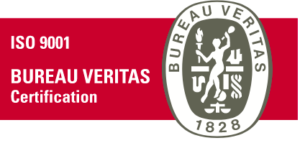
Course Details
€ 89,00.
- Participation: Individually
- Type: Online
- Language: English
Course content

- Duties of a Safety Officer
- Hazard identification
Managing hazards
- Risk assessment
Incident investigation
Certification:
- The Assessment consists of multiple-choice questions
- After passing the assessment, you will receive a download link for your signed and stamped certificate
- You are free to (re)print your certificate anytime. An original hard-copy by mail can be ordered (not included)
How it works
Go digital and save time. Simply sign up and you can start the course immediately.
2. Take the course
You will need a PC, laptop, tablet or smartphone (iOS or Android). You can take the course online or download the course.
3. Assessment
The Assessment consists of multiple-choice questions. Upon successful completion of the assesment you will receive your certificate.
4. Certificate
You will receive a download link for your certificate. You are free to (re)print your certificate anytime. A signed and stamped original hard-copy by mail can be ordered.
Can I take this STCW training completely online?
Yes, this training is fully online, and you can join anytime.
What are the specifications of the Safety Officer on Board certificate?
- The course is based on STCW A-II/2 & A-III/2 guidelines and IMO Model Course 3.11 (Marine Accident & Incident Investigation).
- This course is approved by Emergency Control Maritime Training BV (dba STCW.online), a maritime training institute based in Rotterdam.
- Several of its STCW courses are approved by the Dutch (EU) maritime authorities under ID: NL45 or/and the Liberian Register (if applicable). Both countries are on the IMO “Whitelist”.
- This course does not require flag state approval.
What is the duration of this Safety Officer on Board course?
- This course takes an average of three (3) hours to complete.
- This also depends on your English language proficiency. Native speakers might need less time.
What is the language used in the online Safety Officer on Board course?
Our online STCW courses are all in English (except specific language courses).
Who should take our online Safety Officer on Board course?
This online course is designed for the safety officer of a ship.
Why do I need the Safety Officer on Board course?
Taking this course will help the safety officer to prevent incidents and potential hazards on board. The subjects relevant to ship’s safety are covered in this Safety Officer on Board course.
What is the content of our online Safety Officer on Board course?
This course contains the following elements:
- Upon completion of this course, you will become familiar with cyber security and be able to: Have the knowledge of the general dangers involved in shipboard operations
- Understand the role of a safety officer
- Understand the importance of identifying general hazards and safety awareness
- Carry out Risk assessment
- Carry out accident investigations and root cause analysis
What you will learn
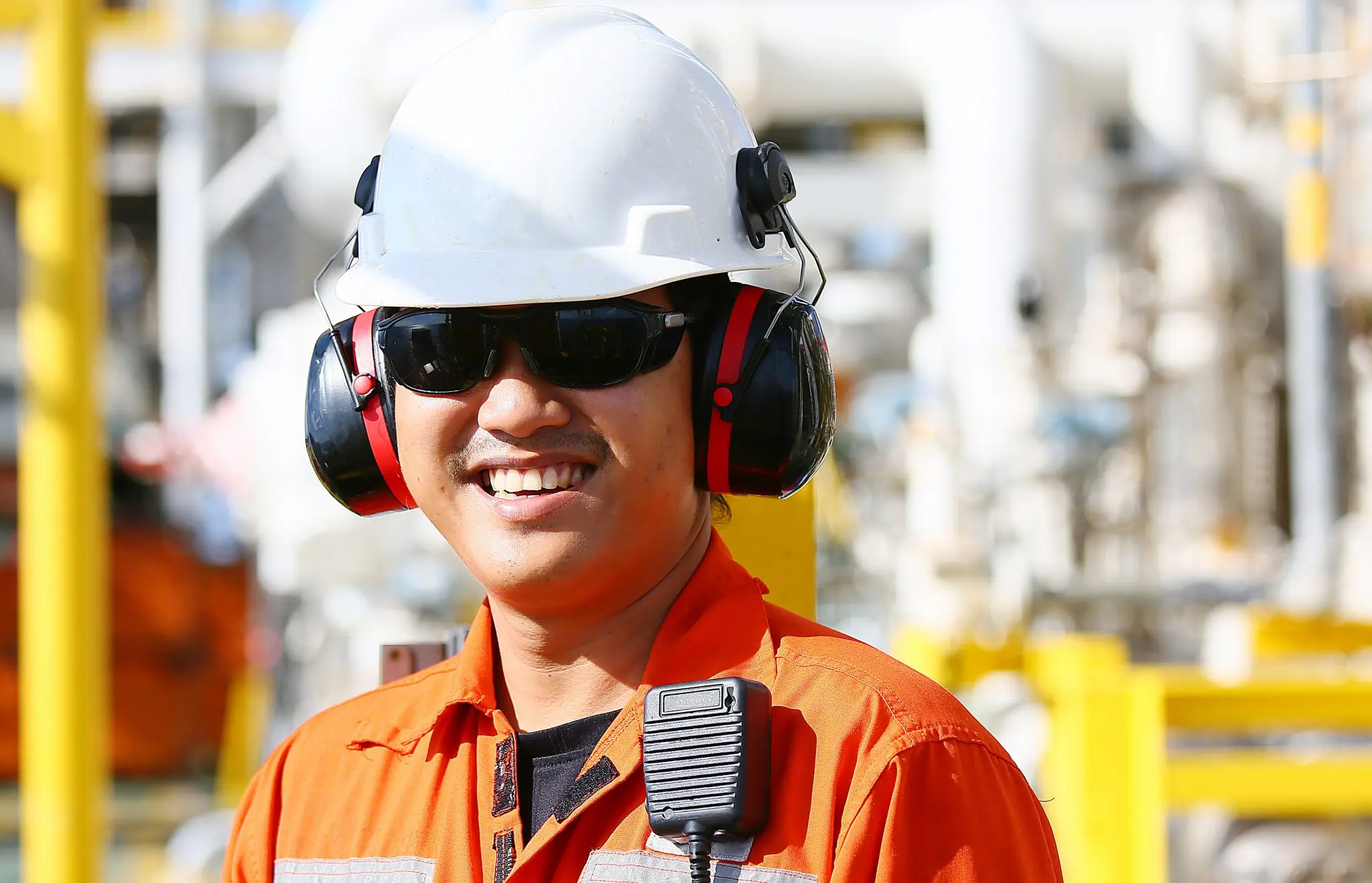
The duties of a Safety Officer
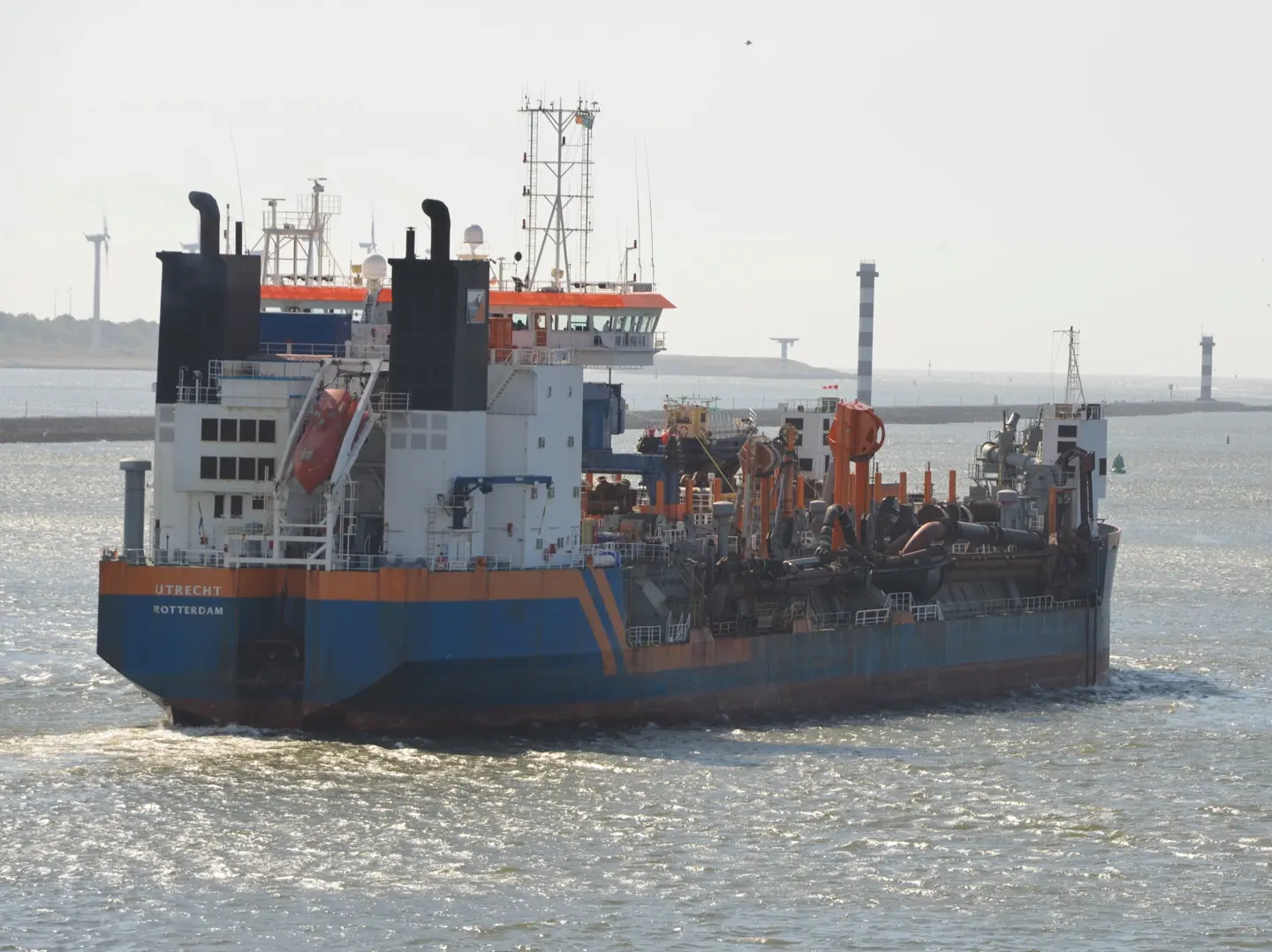
Learn all the aspects of ISM code
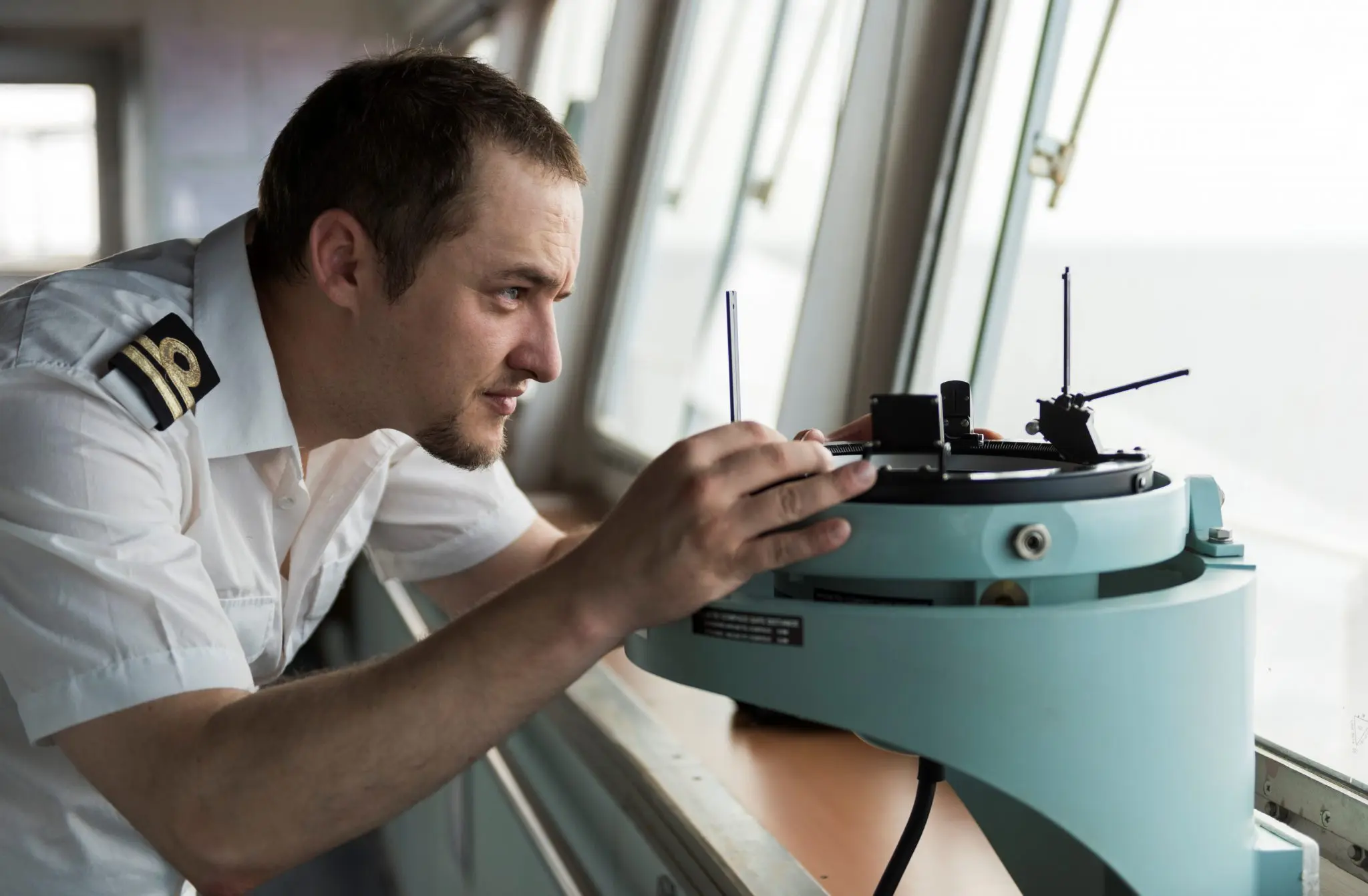
Identify and manage hazards
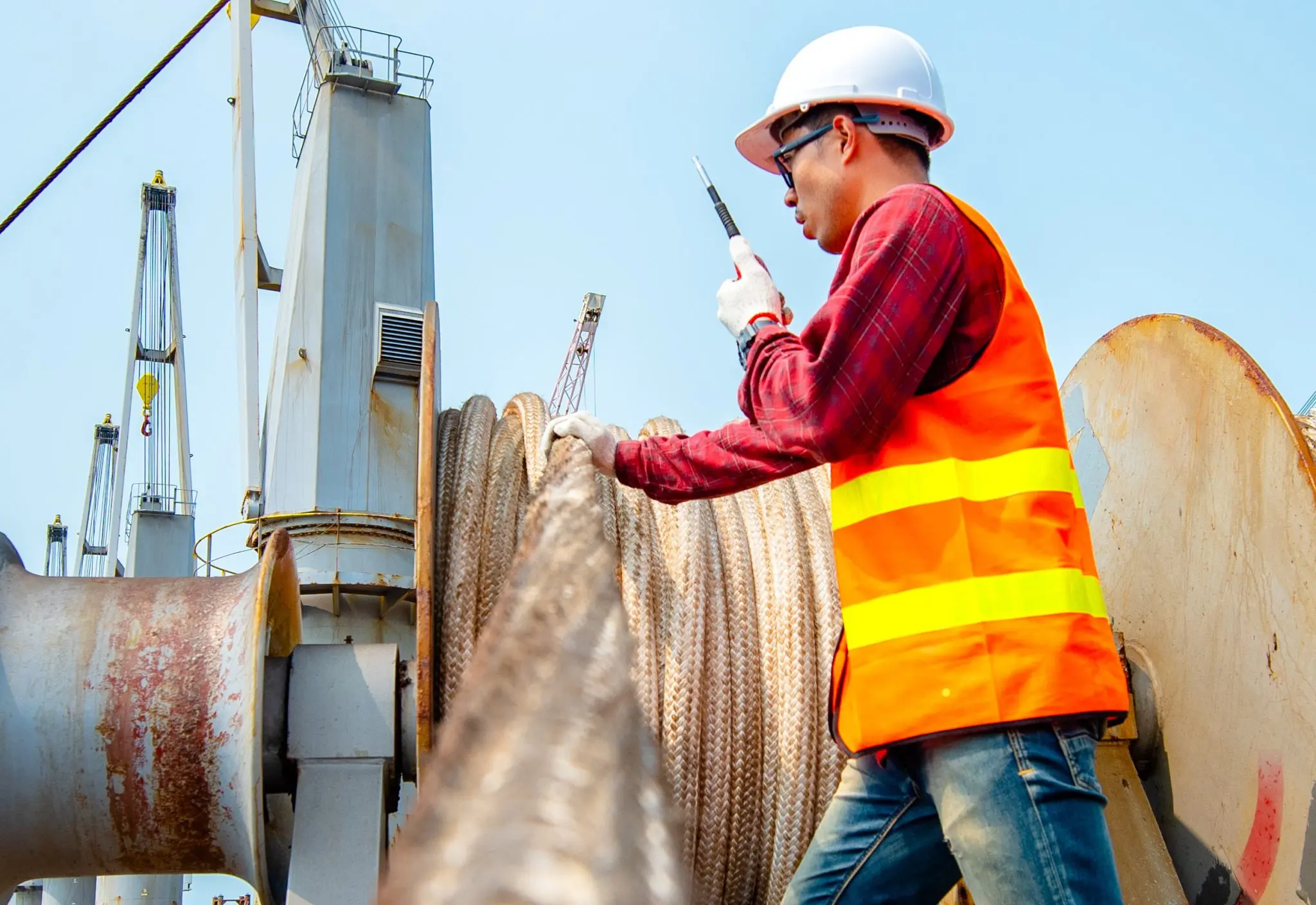
Lead the investigation of incidents
This is the announcement bar for Poornima to test the Close Button. It will expire May 31 2024.
- Pre-Cruise FAQ
- Onboard FAQ
- Post-Cruise FAQ
- Cruisetours FAQ
- Special Offers Sign Up
- Cruise Deals
You have been logged out
Your window will update in 5 secs
Onboard Employment FAQ
Are you interested in joining the thousands of worldwide employees who are proud to be part of the Princess Cruises family? We are committed to being an employer of choice and understand that our Consummate Hosts need to be supported, empowered, and recognized.
We also understand that working at sea can be a challenging new opportunity. Here are answers to some essential questions you might have when considering cruise ship employment.
- What are the requirements to work onboard?
What is a C1/D visa?
How do i get a medical certificate, which ship will i be assigned to, how do i get to and from the ship i am assigned to, do i need travel insurance, how long will i be onboard, can i get off and go home during the contract, will i have my own room, what is the power voltage in my cabin, can i drink alcohol onboard, is there a drug policy, is there a curfew, can i bring a family member or friend onboard, will i have access to guest areas and amenities during my time off, once onboard, how do i stay in touch with my friends and family back home, can i have mail delivered to the ship, is there an atm onboard to use, will i have to pay taxes, can i send money home from onboard, how do i pay for items onboard, how do i do laundry, what if i miss the ship in port, what happens if i get sick while working onboard, can i visit the ports while working onboard, how do i apply to work onboard, what are the requirements for onboard employment.
While specific position requirements depend on the job you are interested in, there are some essential requirements that all crew must meet to work onboard:
- Be 21 years of age or older
- Be able to pass a criminal background check
- Hold a valid passport
- Have a US C1/D visa (if you are not a Canadian or US citizen/resident)
- Have a Princess-specific pre-employment medical exam certificate
- Meet the English fluency requirements relevant to your position
Also known as a seaman's visa, some nationalities need this to work onboard a ship and travel to certain countries. This visa normally lasts between two and five years. You will be required to make an appointment at your nearest US Embassy to gain this visa; all paperwork for the appointment will be supplied by your manning agency.
This extensive examination is at the employee's expense and can be conducted through one of Princess's recommended medical facilities—you'll be advised which one is closest to you. Once this is completed and approved by our corporate Medical department, you are cleared to travel and work onboard.
Shipboard employees are scheduled to vessels based on operational need. This means you could be assigned to any one of our vessels in the fleet depending on where a position is open at the time you are travel-ready. After your first assignment, we will be able to provide details about the next assignment after your leave period.
At the beginning of each contract Princess Cruises will provide flights from your designated airport to your assigned ship. At the completion of your contract, Princess will arrange for your travel back home as well. It is your responsibility to get to the airport from your home, but from there we will provide any necessary accommodations and/or transportation to and from the ship.
While you are covered medically in Los Angeles and onboard the vessel, we suggest you purchase basic travel insurance to cover the cost of lost luggage or injuries that could result from shoreside activities.
Contract lengths vary by position but range between four and ten months. After each contract you will receive approximately 60 days of vacation before your next assignment. Your daily work schedule while onboard will depend on your particular position, but you can expect to work seven days a week and anywhere between 10-13 hours per day.
Time off during the contract is not permitted. In case of family emergencies, Princess Cruises does understand that additional time at home may be needed and does accommodate these requests on a case-by-case basis.
Accommodations vary depending on the ship and position. Those in non-management positions generally share a cabin with one to three other roommates whereas those in most management positions are entitled to a single cabin. Cabins include a storage space, TV, and DVD player.
All vessels have 120v US power and some vessels also have 220v European power.
Yes, alcohol is available for purchase during time off. However, Princess Cruises has a strict alcohol limit and at no time can a crew member be intoxicated.
Princess has a zero-tolerance drug policy. All crew are subject to random and reasonable-suspicion drug testing. Violation of these policies will result in termination.
There is no set curfew. However, crew who are out late should be respectful of other crew members and guests nearby.
Crew members who meet specific length-of-service criteria have the option of requesting "relatives travel," a benefit that allows family members to sail onboard for a limited period of time. Some restrictions may apply.
While some officer-level positions do allow restricted access to guest areas, most facilities are for guests only. However, we have a variety of crew-only facilities, such as a crew pool, whirlpool, gym, bar, and Crew Club, which is a communal room where you can gather to watch movies, play games, sing karaoke, and much more!
Postal mail services are available while onboard. You will also have access to computers in the crew training areas. Wi-fi Internet is also available in the crew areas if you choose to bring your own laptop or tablet. Princess offers discounted rates for phone and Internet cards so you can stay in touch with those at home. But remember that satellite capabilities are sometimes limited while the ship is at sea.
You will be provided with mailing addresses for ports where mail can best be delivered.
There is an ATM in the guest areas; an ATM charge will apply. You can also cash checks in the Crew Office onboard to get cash.
US citizens will have federal taxes automatically deducted and may be required to pay state taxes, if applicable. All other nationalities are responsible for filing their own tax forms upon returning to their home countries (as they are self-employed).
You can wire money via the Crew Purser's office. Details are available onboard and rates may vary.
You will be provided with a bar account number, which is your personal number for the duration of your contract onboard each ship. As the entire vessel is cashless, even for guests, you will provide your account number at the bars, salon, and shops in guest areas. In the Crew Bar you can purchase a CrewCard and add money onto it for purchases. At the end of every month you will be required to settle your account.
There are crew laundry facilities where the washers and dryers are free of charge—you just provide the soap. You can also use the dry cleaning onboard, but there is a nominal cost.
Crew members who miss the ship should contact the ship's Agent who will be at the port (the address and phone number are always in the Princess Patter, a daily newsletter for our guests). The Port Agent will arrange transportation to the ship's next port of call. However, it is the responsibility of crew to pay these transportation costs. Crew may be disciplined for the offense and could be terminated. Depending on the port all crew members are required to be back onboard half an hour to an hour prior to sailing time.
While onboard, all crew are medically covered and can visit the Medical Clinic for health concerns. If you need to be medically disembarked during your contract, Princess will provide transportation to a land-based medical facility and repatriate you back home.
If you are not scheduled to work during the time the ship is in port, you can disembark the ship with your supervisor’s approval. Occasionally, there are crew-specific activities or tours to participate in.
Safety requirements dictate that a certain number of crew members be present on each vessel at all times. As such, there may occasionally be times when, although not scheduled to work, you will be required to remain onboard while the ship is in port.
Princess Cruises recruits globally through authorized hiring partners. Find a hiring partner located near you.
Once you contact the authorized hiring partner, you can get answers to questions regarding the application process and which positions are currently open in your region.
- Favorites & Watchlist Find a Cruise Cruise Deals Cruise Ships Destinations Manage My Cruise FAQ Perfect Day at CocoCay Weekend Cruises Crown & Anchor Society Cruising Guides Gift Cards Contact Us Royal Caribbean Group
- Back to Main Menu
- Search Cruises " id="rciHeaderSideNavSubmenu-2-1" class="headerSidenav__link" href="/cruises" target="_self"> Search Cruises
- Cruise Deals
- Weekend Cruises
- Last Minute Cruises
- Family Cruises
- 2024-2025 Cruises
- All Cruise Ships " id="rciHeaderSideNavSubmenu-4-1" class="headerSidenav__link" href="/cruise-ships" target="_self"> All Cruise Ships
- Cruise Dining
- Onboard Activities
- Cruise Rooms
- The Cruise Experience
- All Cruise Destinations " id="rciHeaderSideNavSubmenu-5-1" class="headerSidenav__link" href="/cruise-destinations" target="_self"> All Cruise Destinations
- Cruise Ports
- Shore Excursions
- Perfect Day at CocoCay
- Caribbean Cruises
- Bahamas Cruises
- Alaska Cruises
- European Cruises
- Mediterranean Cruises
- Royal Destinations
- Cruise Planner
- Make a Payment
- Check-In for My Cruise
- Beverage Packages
- Shore Excursions
- Update Guest Information
- Book a Flight
- Dining Packages
- Royal Gifts
- Required Travel Documents
- Transportation
- Book a Hotel
- Redeem Cruise Credit
- All FAQs " id="rciHeaderSideNavSubmenu-7-1" class="headerSidenav__link" href="/faq" target="_self"> All FAQs
- Boarding Requirements
- Future Cruise Credit
- Travel Documents
- Check-in & Boarding Pass
- Transportation
- Perfect Day at CocoCay
- Post-Cruise Inquiries
- Royal Caribbean
- Celebrity Cruises
At Royal Caribbean International, the safety and security of our guests and crew is our highest priority and fundamental to our operations. Our marine safety record over our 42-year history clearly illustrates our commitment to the safety of the millions of guests and crew that sail on our ships. The measures we take in the interest of safety are many, with our ships often exceeding what is required by regulatory authorities - these are all part of our ongoing commitment to innovation and continuous improvement in every aspect of our business.
At the beginning of every cruise, all guests and crew must complete a drill known as the "muster" drill , to ensure they are familiar with what to do and where to go in the unlikely event of an emergency. To further ensure they are aware of their specific muster location, we identify it on each of guest’s card keys. The location also is prominently noted on the back of every stateroom door. In addition to the muster drill for our guests, our officers and crew conduct weekly, monthly and annual drills on every ship, and complete extensive training, certification and scenarios in preparation for the very unlikely event of an emergency, including training on ship evacuation procedures. All of our ships have sufficient lifesaving craft to accommodate every guest and crew member onboard, as well as additional capacity in reserve. All of our ships are designed and operated in compliance with the strict requirements of the International Maritime Organization , the UN agency that sets global standards for the safety and operation of cruise ships, codified in the Safety of Life at Sea (SOLAS) Convention . Safety-related regulations are rigorous – and we often go above and beyond what is required; for example, carrying backup mechanical, navigational and safety provisions. In addition, our vessels, regardless of where they sail in the world, comply with the U.S. Cruise Vessel Security and Safety Act (CVSSA) requirements, including railing heights, access control, closed circuit TV, medical preparedness, crime allegation reporting and crew training. Our own requirements generally exceed those specified within the CVSSA. We work closely with regulatory authorities to improve safety laws, and regularly participate in discussions and studies to inform legislators of current practices and offer our perspective on regulations and standards to assure safety. Flag State authorities and other maritime safety regulatory bodies, such as the U.S. Coast Guard, from each country our ships visit also regularly inspect our ships. Their examinations focus on life-saving equipment and safety and environmental protection items and these officials have the authority to prevent our ships from sailing if we fail to adhere to regulations. In addition to these inspections, ongoing system of internal as well as external (independent) marine expert audits also helps us remain vigilant, safely operate our ships and maintain effective systems.
Royal Caribbean Cruises Ltd. is committed to the safety and health of our guests and crew. We are closely monitoring the Zika virus situation and are aware that the CDC has issued a travel alert for certain countries where Zika virus transmission is ongoing. Guests seeking additional information on the Zika virus are encouraged to contact their primary care physician or visit the CDC's website .
Royal Caribbean International is committed to preventing illegal activity and treats all allegations seriously. We report all allegations of crimes to law enforcement, regardless of the validity of the claim. The Cruise Vessel Security and Safety act of 2010 (CVSSA) requires that statistics for cruise ship crime allegations be posted on the Internet by the US Government for public viewing. This public reporting requirement is unique to the cruise industry, as there is no similar requirement for any other commercial industry, including hotels and airlines.
Cruise lines which operate in United States waters are required by U.S. law to make a Security Guide and certain law enforcement points of contact available to guests. This Security Guide can be found here .
During each voyage, we remain dedicated to safeguarding our guests and crew, as well as the destinations and marine environments where we operate. We invite you to read more about our efforts on our corporate site.
One of the most amazing parts of your cruise vacation experience will be the many rich and varied cultures represented among our guests. This diversity offers a chance to learn about different parts of the world and to make new friends. But just as a new friend can enhance your vacation experience, some guests may behave in ways you find unusual or undesirable. Since our guests do come from different and diverse backgrounds, it is important that everyone have a common understanding of the behavioral standards in place on Royal Caribbean International ships. We invite you to review our Guest Conduct Policy , which sets forth behavioral standards to help you participate in a safe and enjoyable cruise experience.
To facilitate our ability to continue to provide safe and enjoyable cruises to our guests, we reserve the right to refuse to accept a booking request from an individual or group and reserve the right to cancel an existing reservation. For more details, see our Refusal to Transport Policy .
For more information on this topic, read other frequently asked questions about safety .
Previewing: Promo Dashboard Campaigns
My Personas
Code: ∅.
- Blog SQLearn blog posts
- E-learning Company Profile
- Quality Policy
- Participation in EU projects
- Career opportunities
- Maritime Training Solutions Overview
- Maritime CBT online library
- Training Management System (TMS)
- Seafarers Competence Management System
- Vetti: Vetting Inspections preparation software
- Maritime Training AI Assistant CaptAIn
- Virtual Reality Training
- Online CBTs for Rightship Inspection Questionnaire (RISQ)
- Online CBTs for OCIMF SIRE 2.0 inspections
- CBT training matrix for Tanker Management Self Assessment (TMSA)
- STCW Basic Training Online
- STCW courses for Cruise Ships
- Schedule a call
- STCW courses ESHOP
- E-learning Demos
STCW certificates, what courses do I need to work on a Cruise Ship or Super Yacht? 2024 edition
- SQLearn Maritime Training Blog
- STCW certificates, what courses do…
STCW course and certificate requirements for Cruise Ships or Super Yachts . So you want to work on a Cruise Ship or Super Yacht, your future employer asked you to provide STCW certificates , and now you are wondering where to start and what courses you need.
Major cruise line companies like Carnival, P&O Cruises, Royal Caribbean, Norwegian Cruises, MSC Cruises, and TUI Group would request STCW training from marine and non-marine crew members.
Each employer might require different training depending on the position you apply for and the vessel’s flag. The most common flags for cruise ships are Panama, Bahamas, and Malta.
The same requirements apply to Super Yacht recruitment as well.
A little history
S tandards of T raining, C ertification, and W atchkeeping (STCW) for Seafarers was initially an International Conference. It was originally held in 1978 at the International Maritime Organization (IMO) in London.
Subsequently, the STCW Convention has been revised, with the most significant amendments taking place in 1995 (stcw 95) and 2010 (also known as stcw 2010 or Manila amendments). STCW Code, in Part A, contains mandatory provisions with the minimum training standards required for a seafarer, based on their rank, to be able to get onboard a vessel.
STCW is a comprehensive set of international regulations that determine the qualifications and certifications required of all seafarers. The STCW regulations are agreed upon by the International Maritime Organization (IMO) and are adopted and implemented in signatory countries worldwide, such as the US and Canada. STCW establishes minimum requirements for personnel operating ships’ qualifications, competencies, and responsibilities.
The STCW code applies to all ships engaged in international voyages and personnel on those ships. It includes passenger ships like cruise ships and Yachts, cargo ships, tankers, and offshore oil and gas platforms.
Why do you need to take STCW Training?
STCW certificates are a universally recognized document that enables seafarers to show they are qualified to work as crew members on ships of all sizes. An accredited maritime agency endorses the certificate, and must be updated periodically to remain current. Obtaining an STCW certification requires seafarers to complete a series of courses and take the necessary exams. It is essential for those wishing to pursue a career in the maritime industry.
STCW courses provide seafarers with the knowledge and skills necessary to function safely and effectively aboard a vessel. Depending on their experience level, courses may focus on subjects such as safety management, navigation, engineering, communications, crowd management, and human resource management. Upon successful completion of these courses, students are awarded an STCW Certificate.
This document shows they have obtained the required competencies and qualifications to be employed on ships under the STCW regulations.
The STCW Certificate is an important document in the maritime industry and is essential for anyone wanting to work in a shipboard capacity. A valid STCW certification is required for safe and effective ship operations.
STCW Certificates, where to start from?
Next, in this guide to STCW Certification, you need to start with STCW basic training, formerly known as STCW basic safety training (aka BST, basic stcw, and basic training). According to STCW Regulation V/2, all personnel of passenger ships, including Cruise Ships and Yachts, are required to take this training.
The training consists of a bundle of four (4) courses titled “ STCW Basic Safety Training courses ,” which every seafarer (marine crew) or non-marine crew, e.g., hotel staff, is obliged to complete before boarding a vessel. STCW BST is composed of the following:
- STCW Personal survival techniques (PST) (STCW A-VI/1–1)
- STCW Fire Prevention and fire fighting (FPFF) (STCW A-VI/1–2)
- STCW Elementary first aid (EFA) (STCW A-VI/1–3)
- STCW Personal Safety and social responsibilities (PSSR) (STCW A-VI/1–4)
The text in the parentheses indicates the STCW code section that each training applies to. Completing the courses mentioned above leads to acquiring the respective STCW Certificates.
But wait, there is more about STCW training (STCW 2010)
In addition to the STCW Basic Training, some companies also require other courses that were added to the STCW 2010 amendments related to security, namely:
- STCW Security Awareness (PSA)
- STCW Designated Duties (DSD)
- STCW Crowd Management on Passenger Ships. Includes Safety training for personnel providing direct service to passengers in passenger spaces.
- STCW Crisis Management and Human Behavior on Passenger Ships
- Ship Security Officer
When do you need to refresh your STCW certificates?
You must repeat (refresh) all four STCW Basic training courses every five (5) years.
Crowd Management & Crisis Management training also requires five (5) year refresh.
Security Awareness, Designated Duties, and Ship Security Officer certificates are for life (although some companies might also require refresh training every five (5) years).
Can you get STCW Certificates Online?
Yes, all the courses mentioned above are available online from SQLearn. Completing these STCW courses online with e-learning is a nice option to have. By taking advantage of this e-learning option, you can accelerate the process of obtaining your STCW certificates since you no longer have to wait to book a training date. Thus, you can save time and money that would have otherwise been spent on travel expenses and accommodation when attending an in-person training center.
Besides these advantages, learning online also allows for greater flexibility in scheduling and pacing, allowing students to work at their own pace and on their own schedule. By taking advantage of these benefits, you can efficiently become STCW certified while still balancing other vital responsibilities in your life.

Privacy Overview
- All Job Positions
- Marine Operations
- Recruitment process

Set sail with Carnival Cruise Line and help us bring the FUN to life aboard one of our fantastic vessels as an Environmental Officer Trainee. The EO Trainee role is the first step towards attaining the role of Environmental Officer on board a Carnival Cruise Line ship.
As an EO Trainee, you will be assigned on board a ship for approximately one contract (4 months) and will work closely with an assigned EO to be familiar with the roles and responsibilities of the position. You will essentially follow a daily program and a series of assessments under the supervision of the assigned EO. You will have full access to pertinent areas of the ship (including the navigational bridge, engine room, and hotel), accompanied by the assigned EO to observe the interaction across departments so that you get first-hand exposure to operations and related documentation.
After completing the onboard training and familiarization process, you will go through a series of assessments (EO1 course). Upon successful completion of EO1, you will be offered the Environmental Officer position.
The Environmental Officer is vital in ensuring full implementation of the Company’s environmental and HESS (health, environment, safety, security) policy and procedures. As part of the Deck team, you will handle all matters involving environmental compliance onboard our ships. You will help promote a strong safety culture and adhere to relevant maritime environmental legislation and Company procedure.
You’ll be working all around our vessel as a non-watch standing officer, maintaining the highest levels of safety. As with all our team members, you’ll be a highly visible member of the team and will constantly interact with our guests and help them with questions. The vacation experience we promise our guests will start with you!
As an Environmental Officer, you be will responsible for the following,
- Oversees environmental compliance of the ship, having unrestricted access to all areas on board unless otherwise stipulated in ENV procedures
- Reports about environmental management and performance onboard
- Enforce and promote Safety procedures in the team/Department under the responsibility
- Facilitate a work environment that supports a successful safety culture, responsible for ensuring that his/her team implements and maintains an effective Hess management system.
- Responsible for monitoring the follow-up of environmental findings and keeping specific Environmental documents up to date
- Assists the Captain and the Environmental shoreside management to answer questions or complaints from guests or crewmembers about alleged environmental misbehaviors
- Responsible to spot check on external contractors working on board in the context of relevant environmental issues and checking records of instructions given to them
- Designated person to liaise between the ship and shoreside offices for all environmental-related issues and responses to send to the relevant shore-side office the monthly environmental data according to the agreed procedure and timing
- Responsible that Captain is promptly and properly informed about environmental incidents and that all incidents are notified to Shoreside offices and relevant Authorities (local, state, federal, international) as applicable and as instructed
- Submits reports on Environmental incidents and checks the correct follow-up and update of environmental incident reports created with the IT systems onboard
Tasks and duties of the Environmental Officer involve the following actions (but not limited to):
o Reports about environmental management and performance onboard
o Provides assistance to the internal and external auditors during environmental audits
o Provides support to all crewmembers in finding a solution to environmental-related problems
o Verifies that all types of waste, may they are liquid or solid, are properly segregated, managed, and labeled until their landing, according to applicable laws and Carnival procedures
o Conducts regular rounds, including Engine Spaces, Garbage Handling, and food preparation areas
o Responsible for periodically checking environmentally relevant Log-books to guarantee their compliance, in accordance with ENV procedures
o Responsible for carrying out Environmental training for all personnel on board, according to Company procedures.
o Responsible for completing and keeping the records of all the environmental training
o Takes part to periodic meetings in the presence of the Captain and the other Heads of Department to discuss environmental issues
o Guarantees the correct sampling of wastewater and other types of waste according to the agreed sampling protocols or as required.
o Responsible for archiving and distribute onboard the sampling results received from the shoreside offices
o Provides support to all crewmembers in finding a solution to environmental-related problems
o Keeping up good communication and transparency between TMs onboard the ship
o Any additional assignment at the discretion of the Captain and/or OLCM
Qualifications:
- Degree and technical training
- Marine Engineering Officer who has achieved 2nd Engineer rank or higher with an STCW A-III/2 certificate of competency, or
- Deck Officer who has achieved the rank of 1st officer or equivalent with an STCW A-II/2 certificate of competency, or
- Former Navy or Coast Guard engineer who has achieved Chief Petty Officer Rank or higher, or
- Engineer with experience in operating or maintaining technical systems similar to those found on cruise ships with at least 3 years of relevant experience and an engineering degree or higher, or
- Have an environmental science degree or higher with at least 3 years of relevant experience.
Required working experience
- At least 3 years of proven experience in the area of technical, organizational, or environmental protection, preferably in the marine or shipping industry
Undergo assigned trainings to develop skills & knowledge for the future positions.
Report any equipment malfunction, difficulties & concerns to the supervisor on duty.
Follow additional duties, other than listed in the job description, assigned by management due to the operational needs/shortages/changes.
Ensure beverage stations are full at all times and cleaned daily.
Engage in light conversations with guests always greet them with a smile.
You should have at least 2-4 years of experience in a similar role.
Advanced level proficiency in English is required.
Minimum guest interaction might be required.
You must pass a Seafarers Medical Fitness Examination.
You focus on continuous improvement and collaboration.

Environmental Officer Trainee

- Share on Facebook
- Share on SMS
- Share on Email

- Maine's Changing Climate
- Maine Things To Do
- Lewiston Strong
- Let's Talk About It
- Ticks and Lyme
- Dempsey Challenge
- Gardening with Gutner
- Coats and Toys for Kids
- Advertise With Us
- Voice of the Voter
- Closings and Delays
- Meet The Team
- Closing Registration
- Project Heat
- Varsity Club
Emergency and military units across Maine receive terrorist attack response training
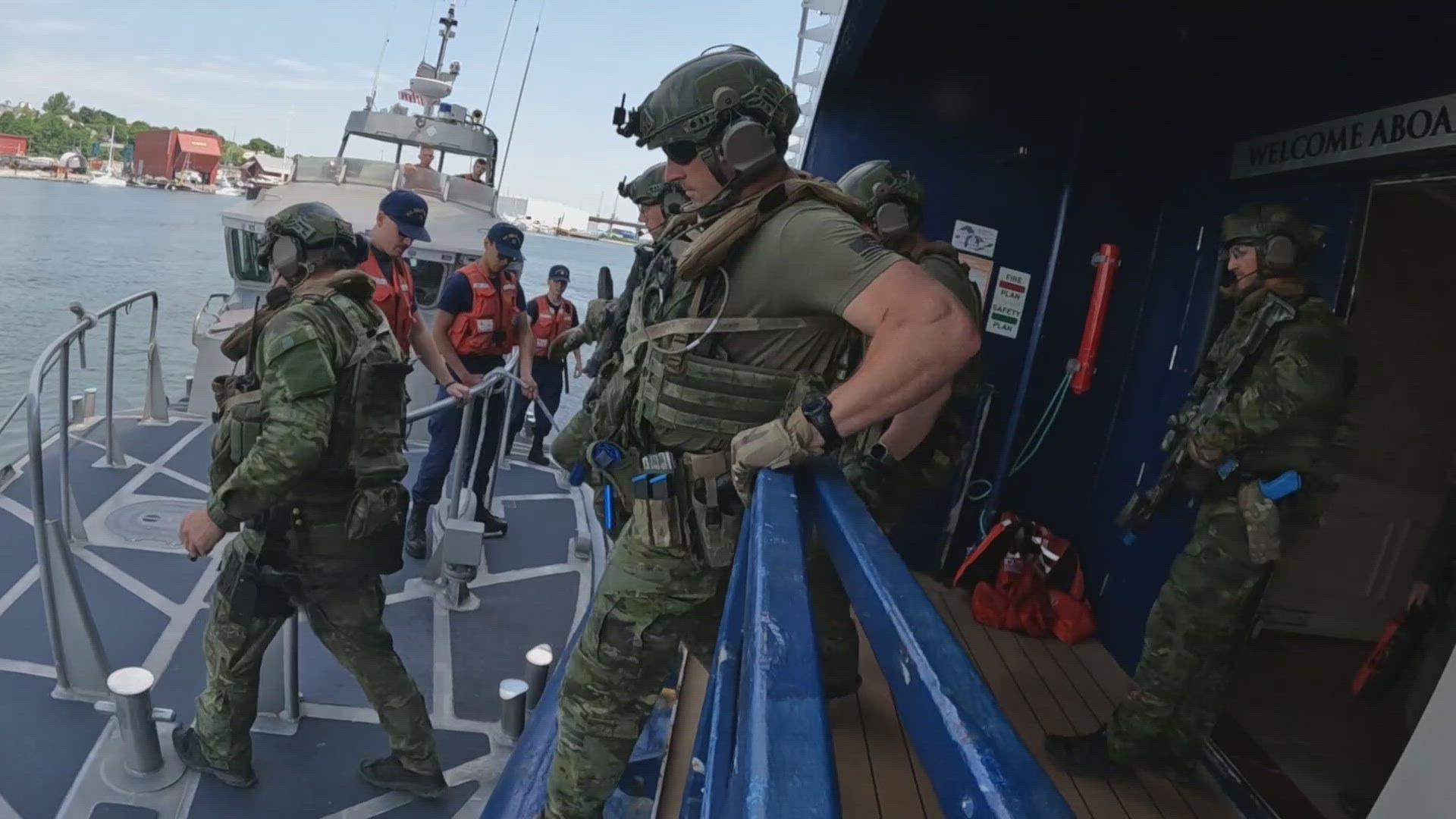
More Videos

Next up in 5
Example video title will go here for this video
SOUTH PORTLAND, Maine — Multiple agencies—including state police, the Coast Guard, and Army National Guard—trained for hostage, explosive, and nuclear material situations on a cruise ship docked in South Portland on Wednesday morning.
It’s part of a four-day series of trainings, including operations in Winthrop and Houlton. The cruise ship is the Ocean Navigator — the ship that had been docked there since October, when an apparent explosion in the engine room injured a crew member and cut short its cruise.
Leadership with the Maine Army National Guard, who acted as a liaison with the press, said the ship's owners offered it as a training ground.
The broad operation was named Katahdin Shield. U.S. Coast Guard Lieutenant Commander Alicia Flanagan sat at a computer in the operation's command center staged at a South Portland hotel. She said all of these local, state, and federal resources were being used so that, if nefarious actors try something in Maine or New England, these teams would be ready to work together seamlessly.
"In the event that we do go through something—some kind of catastrophe or incident—it's not the first time that we've thought about it," she explained. "It's not the first time that we've worked together."
On Monday, a hazmat team from Vermont trained for a hypothetical terrorist attack on a presidential rally at Portland's Cross Insurance Arena, involving an explosive and anthrax. Chief Warrant Officer 2 Anthony Sturgis, of the Maine Army National Guard, helped oversee the training.

"We try to work within all of the potential target locations or vulnerable locations that we possibly can," he said, speaking of the arena and the other venues used around the state.
The training was scheduled to conclude on Thursday. Leaders said this isn’t an annual gathering, but that they try to accomplish something similar semi-regularly, rotating the host state each time.
Related Articles
- Driver dies after truck crashes into home in Hampden
- New Hampshire man gets 40 years to life for killing mother after argument over video game volume
- Woman rescues baby raccoon in Cape Elizabeth
Don't miss these NEWS CENTER Maine stories
Before You Leave, Check This Out

WCSH would like to send you push notifications about the latest news and weather.
Notifications can be turned off anytime in the browser settings.
Basic Requirements for Working on Cruise Ships
While specific position requirements and experience depend on the job you are interested in, there are some other essential requirements that all employees must meet to be able to work onboard a cruise ship.
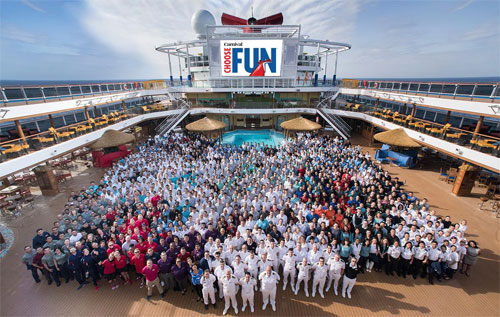
- Be at least 21 years old . Sometimes candidates aged over 18 years are accepted for certain positions (e.g. childcare). This varies by cruise line so check on each cruise line’s careers website or job adverts here on All Cruise Jobs.
- Hold a valid passport
- Only US citizens and Green Card holders may work on US-flagged vessels;
- Cruise lines with ships sailing European rivers employ mostly EU citizens;
- If your ship embarks in a US port you will need the C-1/D visa. You will usually apply for the visa after you get a job offer.
- Meet the language requirements relevant to your position. English is required by most cruise lines. Employees in passenger-facing positions on-board ships with international passengers may be required to be fluent in other languages, e.g. German, French, Spanish, Japanese, Mandarin, Korean, etc.
- Pass a medical examination by the cruise line or have an ENG1 or an ML5 seafarer medical fitness certificate to work at sea.
- Have a valid STCW Basic Safety Training (BST) certificate (this is required for most employees and crew working on-board cruise ships). In some instances you will get an opportunity to take the training after you join your ship. However, candidates who already have valid STCW certificates are usually prioritised.
Cruise companies and recruiters are used to employing staff from all over the world. They know how to obtain the necessary visas and work permits and they will assist you and guide you through the process once they have offered you a job and you have accepted it.
Cruise Ship Jobs
- Housekeeping Jobs (81)
- Galley Jobs (277)
- Restaurant Jobs (114)
- Beverages Jobs (81)
- Provisions Jobs (8)
- Deck Jobs (108)
- Engine / Technical Jobs (112)
- Guest Services Jobs (94)
- Retail Jobs (43)
- Spa & Beauty Jobs (46)
- Child Care Jobs (14)
- Entertainment Jobs (164)
- Photography Jobs (21)
- Shore Excursions Jobs (37)
- Medical Jobs (22)
- Sport & Fitness Jobs (17)
- Casino Jobs (15)
- IT Jobs (13)
- Management Jobs (49)
- Administration Jobs (49)
- Land Based Jobs (52)
- Other Cruise Jobs (20)
- Private Estate Jobs (17)
Find jobs by department
CV Writing Service
Have your CV written by a professional CV Writer who specialises in writing CVs for candidates looking for cruise ship jobs.
Email address:
Remember me Forgotten password?
Password Reset
Enter your email address and we will email you a password reset link.
Share this page:

COMMENTS
Safety Officer Salary Range: $5000 to 8000 U.S. per month depending on the cruise line and time served with the company. Possibilities for promotion to a Staff Captain position. Register for Cruise Ship Jobs Now! Click on the links below to review the various cruise lines profiles, cruise ships details and photos:
That being said, you can take several approaches to becoming a licensed security officer aboard a cruise ship, including the following steps: 1. Attend an accredited maritime training program. Many cruise ship security officers must attend an accredited maritime training academy, as this can be a requirement across many cruise lines.
Assist the Staff Captain during inspections. Work with Staff Officer and Hotel Director to resolve issues. The qualifications for the Safety Officer position are that they must have either a Captain or Master certificate. They also need to have experience on cruise vessels for the position. Excellent English is expected - spoken and written.
Proficiency in Security Awareness (as of 1st January 2014) Although these modules can be done separately it is far more cost effective to be done as a package - the STCW Basic Safety Training package - which will save you over 25%: STCW-95 Basic Safety Training package. Additional courses to help kick start your career in the cruise industry:
The Safety Officer is to be in control of all STCW /emergency preparedness training, oversee safety training, promote safety awareness, to carry out safety risk assessments/safety incident investigations and follow up onboard. Subordinated and reporting to the Safety Officer is the Firefighter/Fireman and Safety Secretary.
The details of the training guidelines for the Ship Safety Officer is provided in STCW Code 2010 Table A-II/2 & A-III/2 and IMO Model Course 3.11 (Marine Accident & Incident Investigation). According to the ISM code, a ship safety officer should have a minimum of two years of consecutive sea service.
The answer is, generally, no. They're safe if you follow the same common-sense practices you'd use anywhere else. It's easy to let your guard down when you're having a great time on vacation, but remember: Cruise ships are like floating cities, which means they aren't immune to potential dangers.
Apply the methods of conducting additional training on board a ship for safety and environmental protection. Safety investigation of Casualties & Incidents. Buy Ship Safety Officer online course. For B2B inquiries or more information regarding this online course please get in touch with our Sales Team at [email protected] or at 00302107778877.
You'll need some things to become a Cruise Ship Security Officer and keep everyone safe on sea journeys. First, finish high school or something like that. Get certificates for security and first aid - they're like superhero tools. Then, you'll undergo special training to learn how to handle problems and keep things safe on the ship.
According to SOLAS, cruise ships must meet the minimum requirements of safety when it comes to navigation, communication, lifeboats, fire detection devices, and fire extinguishing apparatus. According to Cruise Lines International Association ( CLIA ), on an average cruise ship there are approximately, five fire-fighting teams with advanced ...
Security Officers. May also be called: Deputy Security Officer. Keeping problems to a minimum, and even eliminating them before they start is the job of the Security Officer. They provide security for the ship, crew, and passengers, as well as for the property on board. The Security Officer is given a Security Plan and is responsible to ensure ...
Courtesy of Natalie Grillo. Cruise officers are in charge of the safety and navigation of massive ships carrying thousands of passengers. Third Officer Natalie Grillo said the position is ...
The Safety Officer is to be in control of all STCW/emergency preparedness training, oversee safety training, promote safety awareness, to carry out safety . May 17, 2024 - Norwegian Cruise Line Holdings - English. Public Safety Officer. The Security Team is responsible for implementing and enforcing the ship's security policies in areas ...
The Safety Officer ensures the proper testing and inspection of all safety systems and equipment onboard and is assisted in these duties by the Assistant Chief Engineer (Deputy Safety Officer). The Safety Officer acts as a supplemental member of the bridge team during periods of heightened manning, and coaches the Second Officers in their ...
It is the duty of the safety officer to look out for potential hazards and means of preventing incidents on board ship. This Safety Officer on Board online course further discusses these topics. The Safety Officer on Board online course is based on the Guidelines given in the STCW A-II/2 & A-III/2 and IMO Model Course 3.11 (Marine Accident ...
While specific position requirements depend on the job you are interested in, there are some essential requirements that all crew must meet to work onboard: Be 21 years of age or older. Be able to pass a criminal background check. Hold a valid passport. Have a US C1/D visa (if you are not a Canadian or US citizen/resident) Have a Princess ...
Security officer: In charge of daily security operations. Supervisors: Overlooks all other security personnel to ensure the ship's safety. The job description of each of these positions differs ...
The Safety Officer functions as the yacht's Statutory Safety Officer and, together with the Chief Officer, oversees, guides and supports nautical operations and maintenance throughout the yacht to ensure the highest levels of cleanliness, maintenance, safety, security and environmental compliance. 29 May 2024 - The Ritz-Carlton Yacht ...
All of our ships are designed and operated in compliance with the strict requirements of the International Maritime Organization, the UN agency that sets global standards for the safety and operation of cruise ships, codified in the Safety of Life at Sea (SOLAS) Convention. Safety-related regulations are rigorous - and we often go above and ...
STCW course and certificate requirements for Cruise Ships or Super Yachts.So you want to work on a Cruise Ship or Super Yacht, your future employer asked you to provide STCW certificates, and now you are wondering where to start and what courses you need. Major cruise line companies like Carnival, P&O Cruises, Royal Caribbean, Norwegian Cruises, MSC Cruises, and TUI Group would request STCW ...
STCW Training. A valid STCW Basic Safety Training (BST) certificate is required from most employees and crew working on-board cruise ships. Some cruise lines provide STCW training to their employees after they join a ship. However, many job seekers are required to hold a valid STCW BST certificate before they start a new job on-board a cruise ship.
Environmental Officer Trainee. Set sail with Carnival Cruise Line and help us bring the FUN to life aboard one of our fantastic vessels as an Environmental Officer Trainee. The EO Trainee role is the first step towards attaining the role of Environmental Officer on board a Carnival Cruise Line ship. As an EO Trainee, you will be assigned on ...
On Monday, a hazmat team from Vermont trained for a hypothetical terrorist attack on a presidential rally at Portland's Cross Insurance Arena, involving an explosive and anthrax. Chief Warrant Officer 2 Anthony Sturgis, of the Maine Army National Guard, helped oversee the training. Credit: NCM.
Cruise lines with ships sailing European rivers employ mostly EU citizens; If your ship embarks in a US port you will need the C-1/D visa. You will usually apply for the visa after you get a job offer. Meet the language requirements relevant to your position. English is required by most cruise lines. Employees in passenger-facing positions on ...